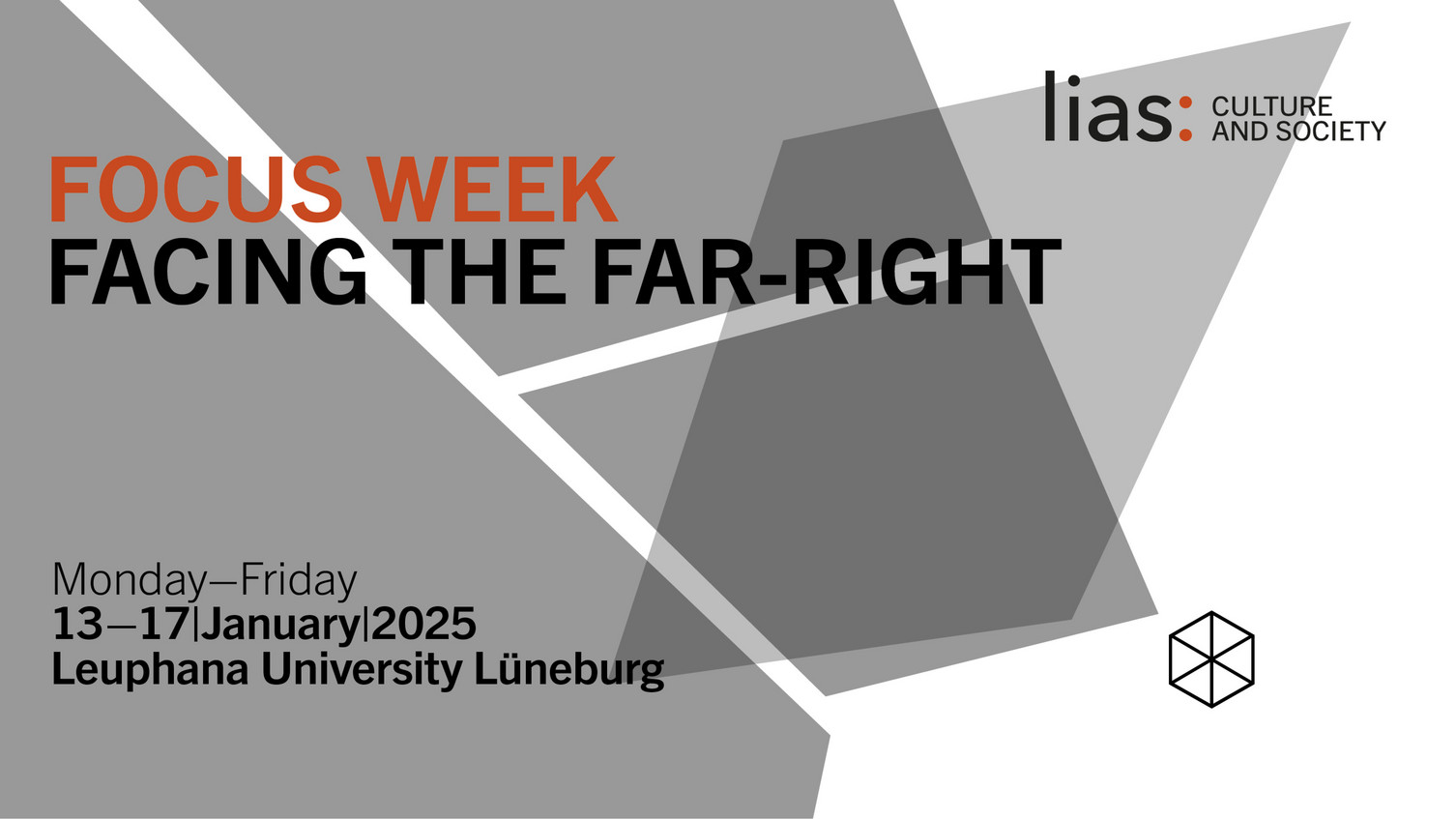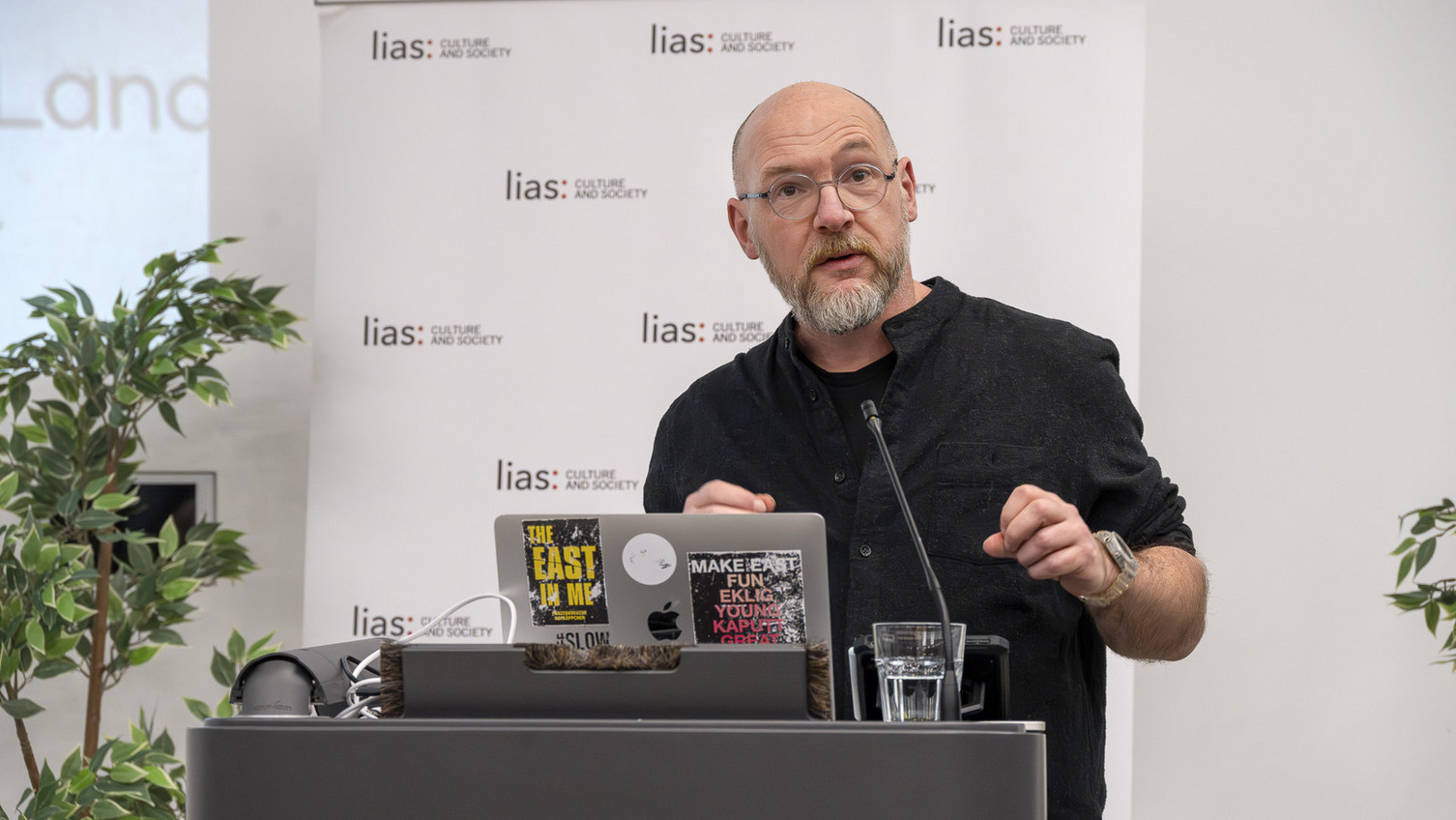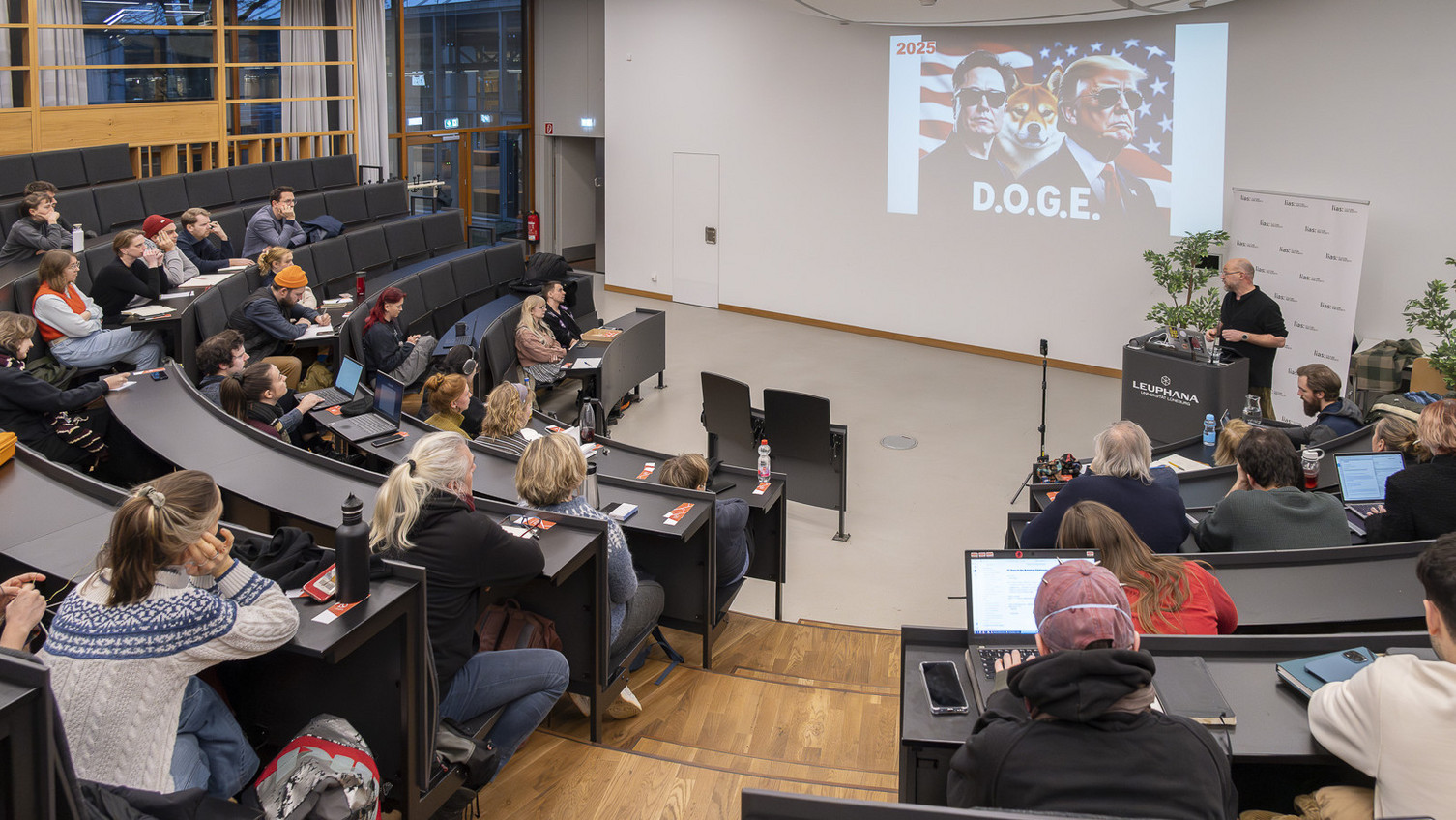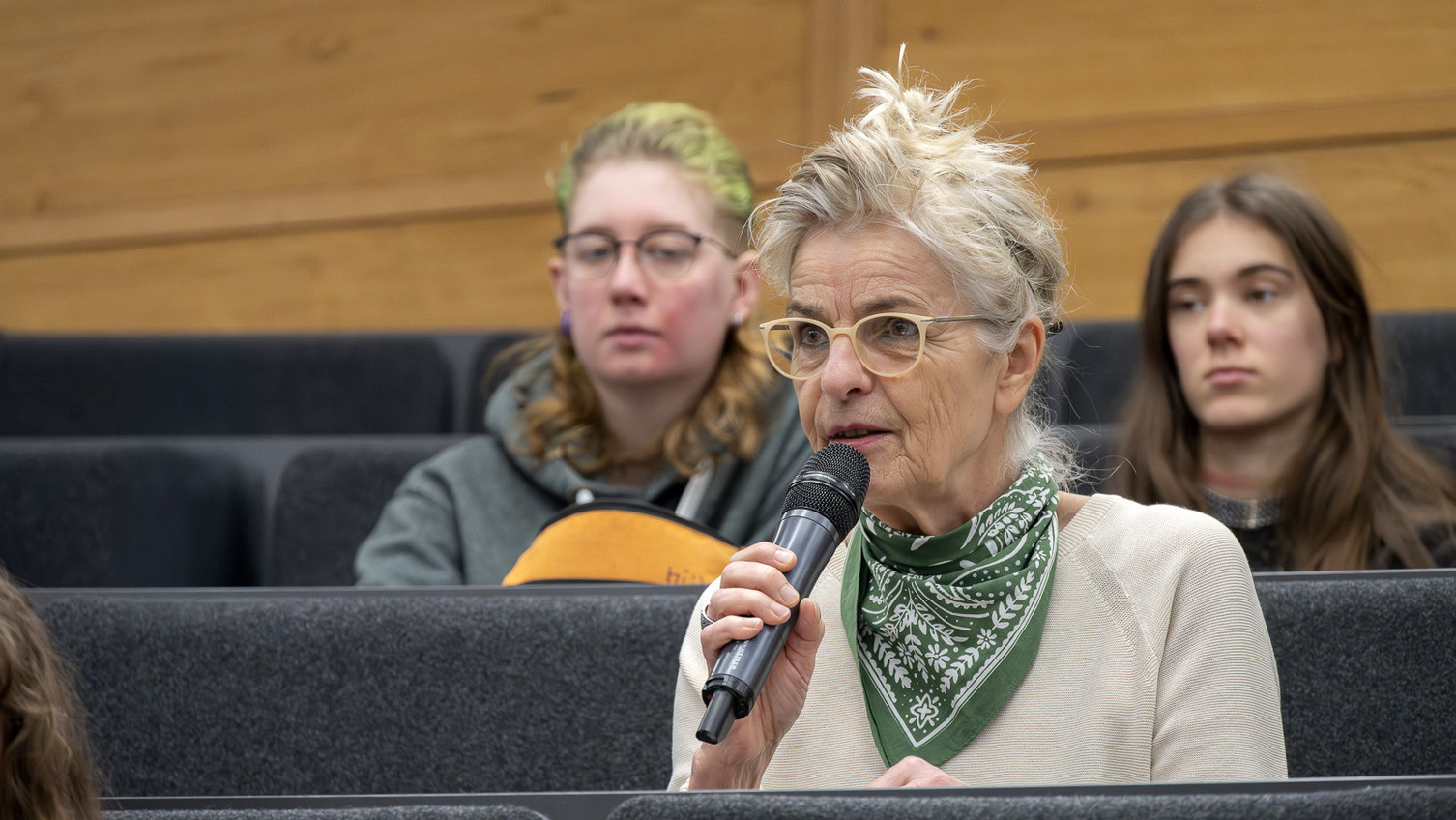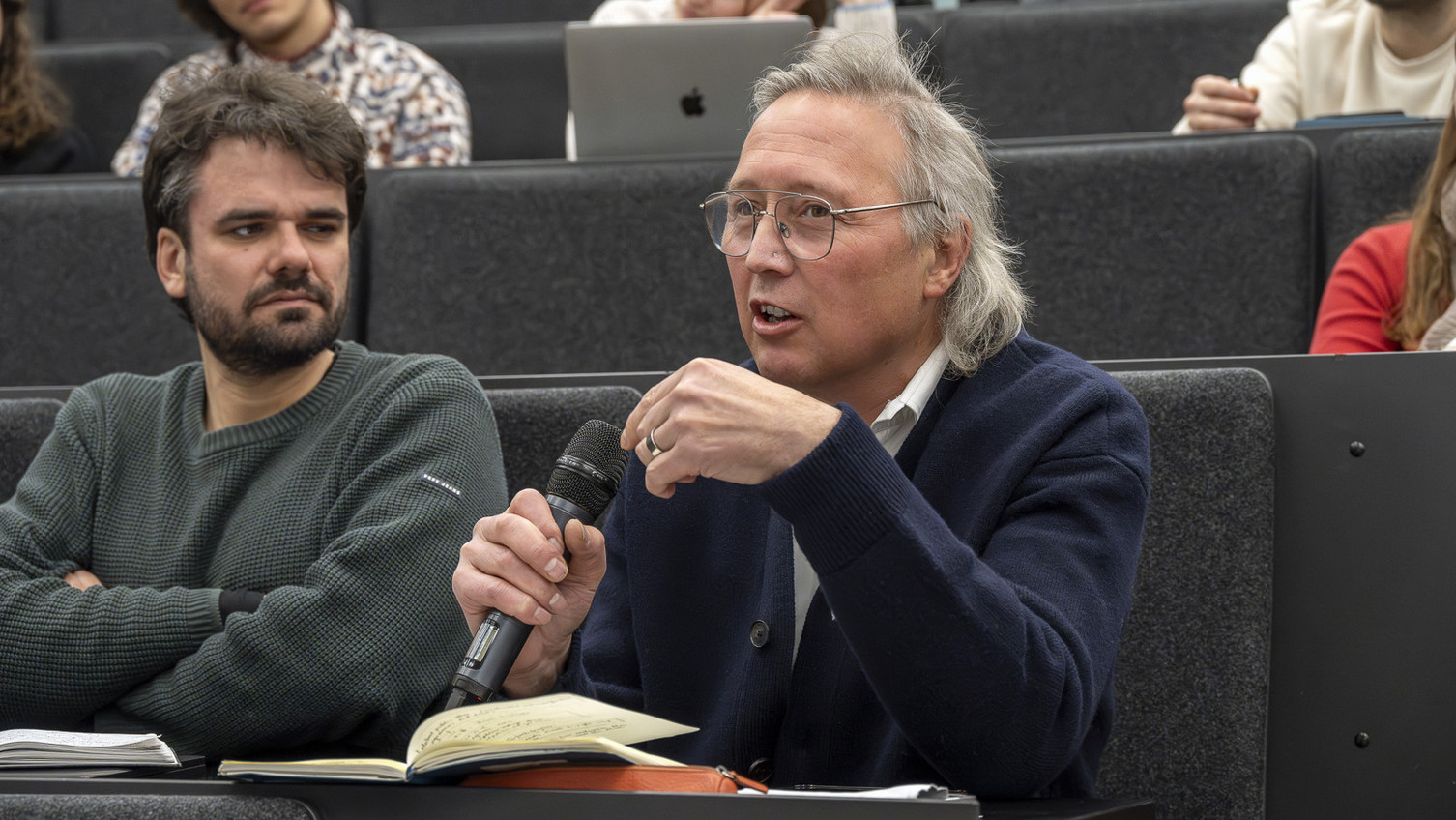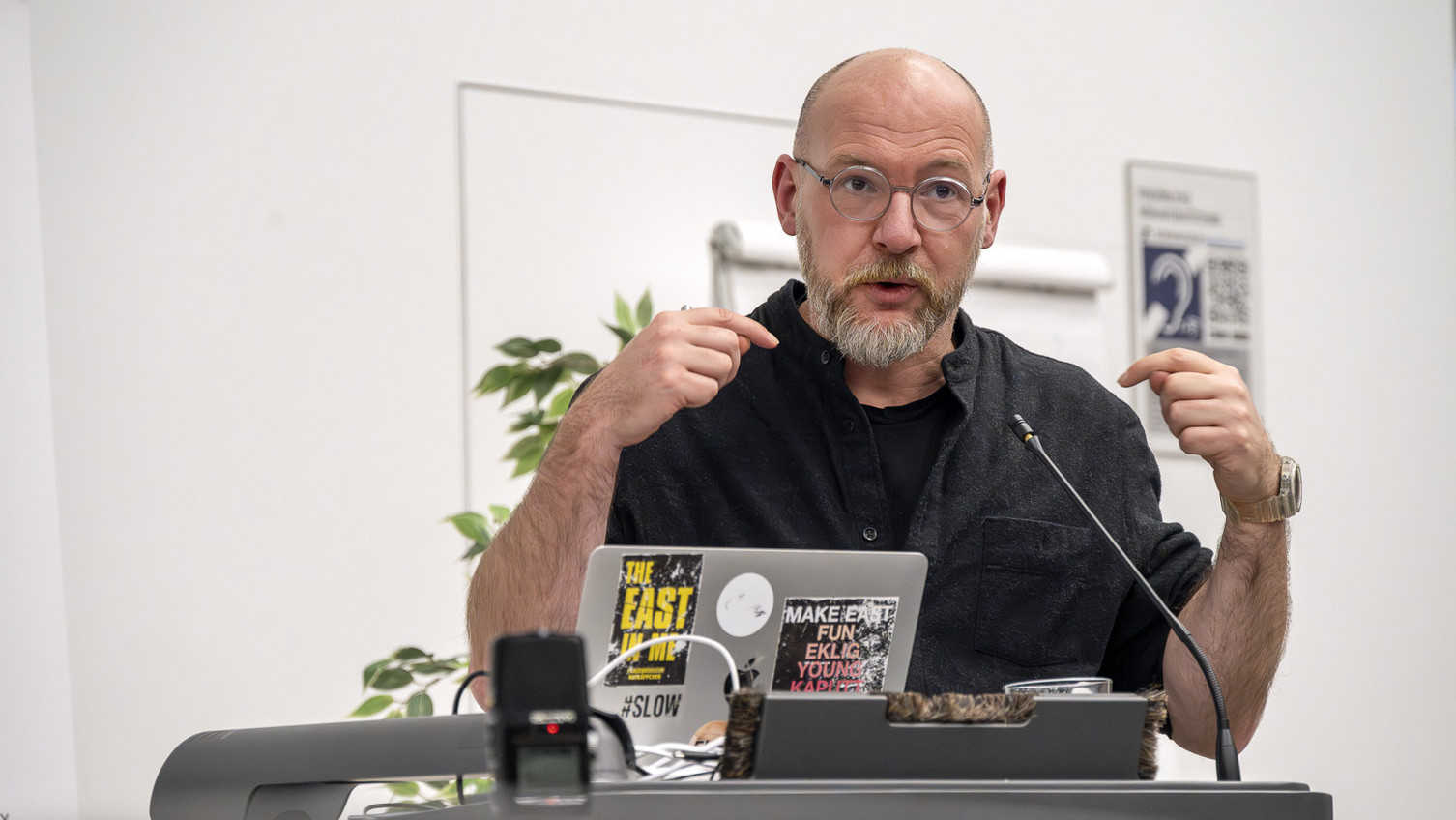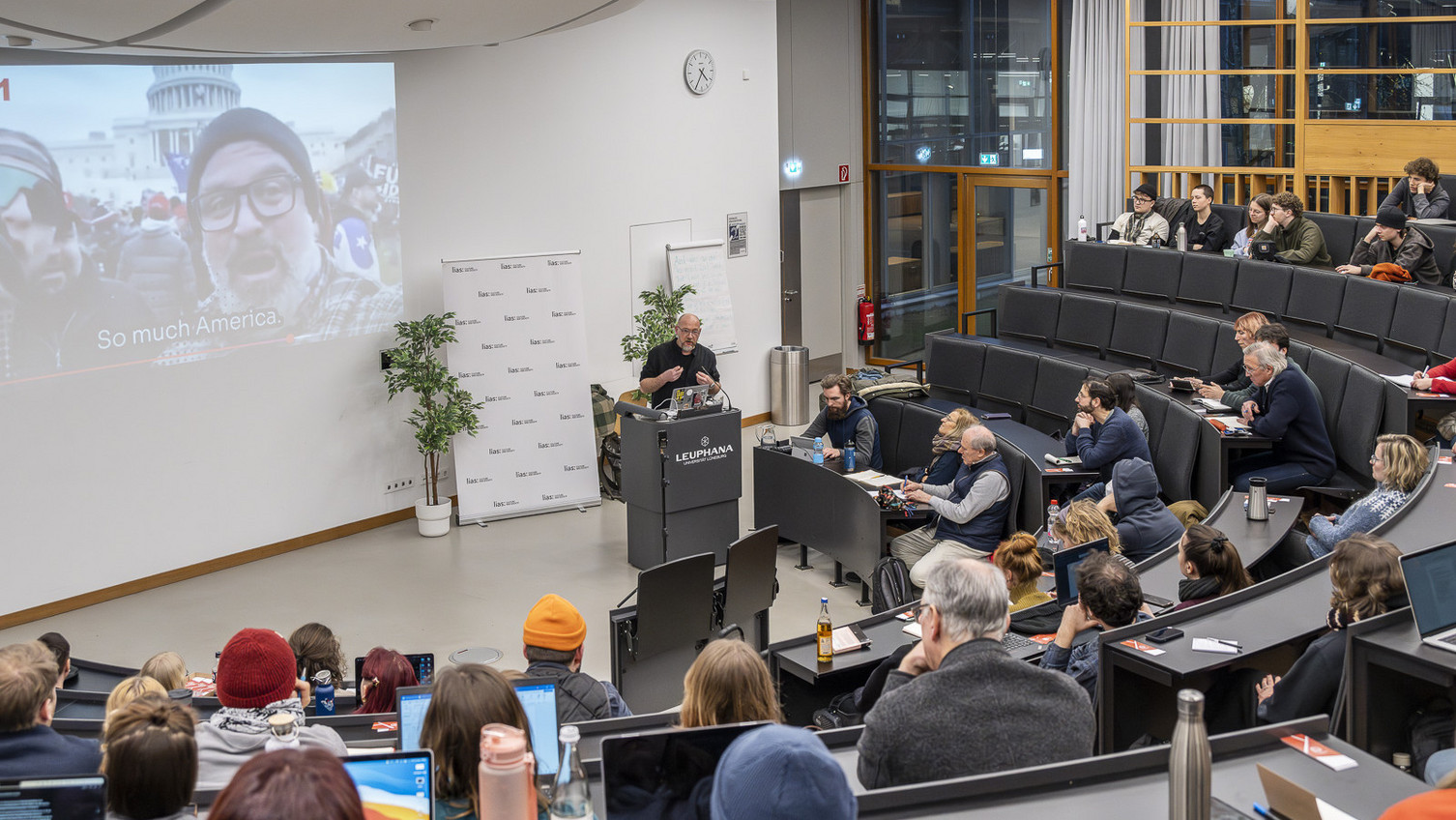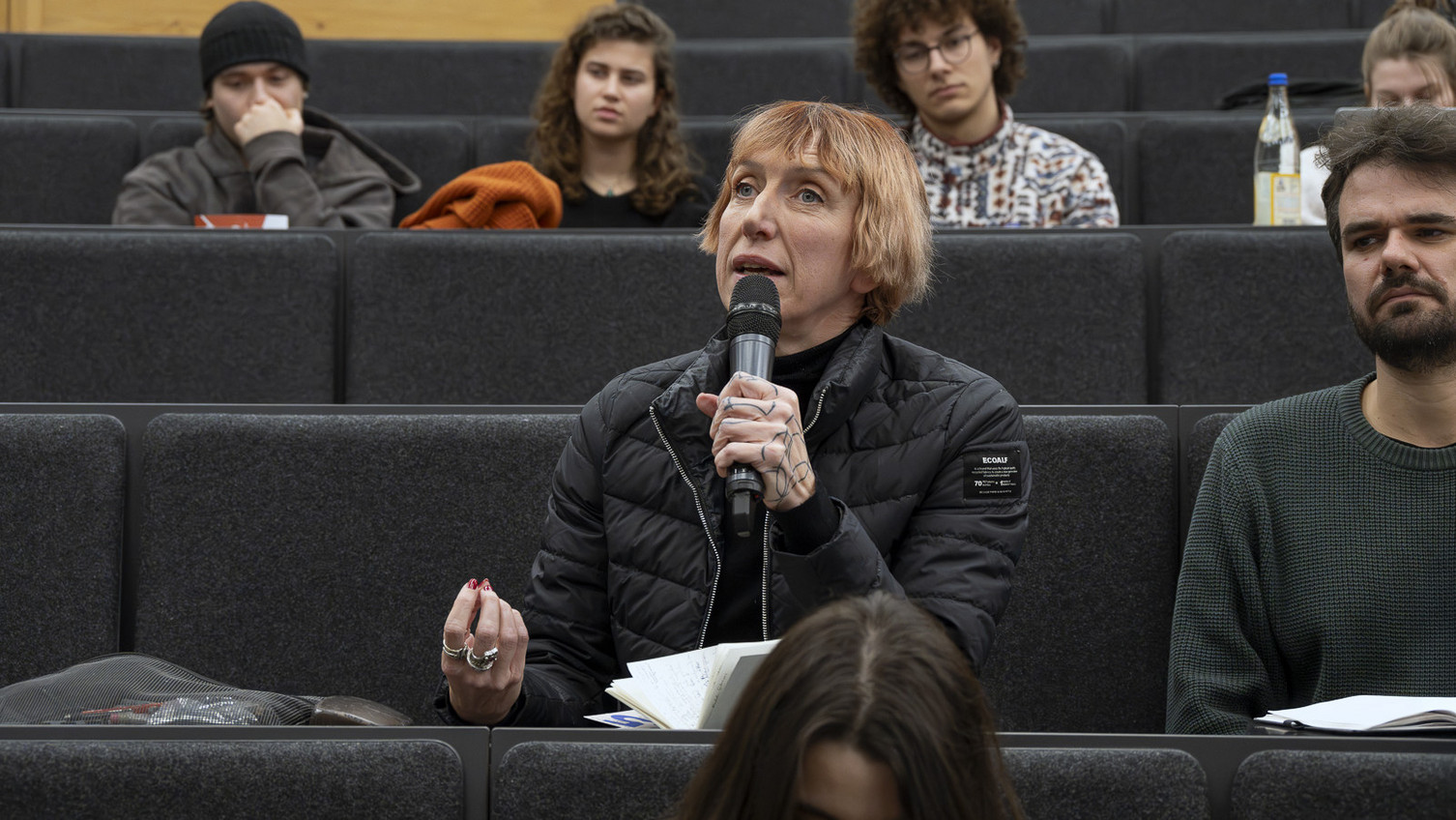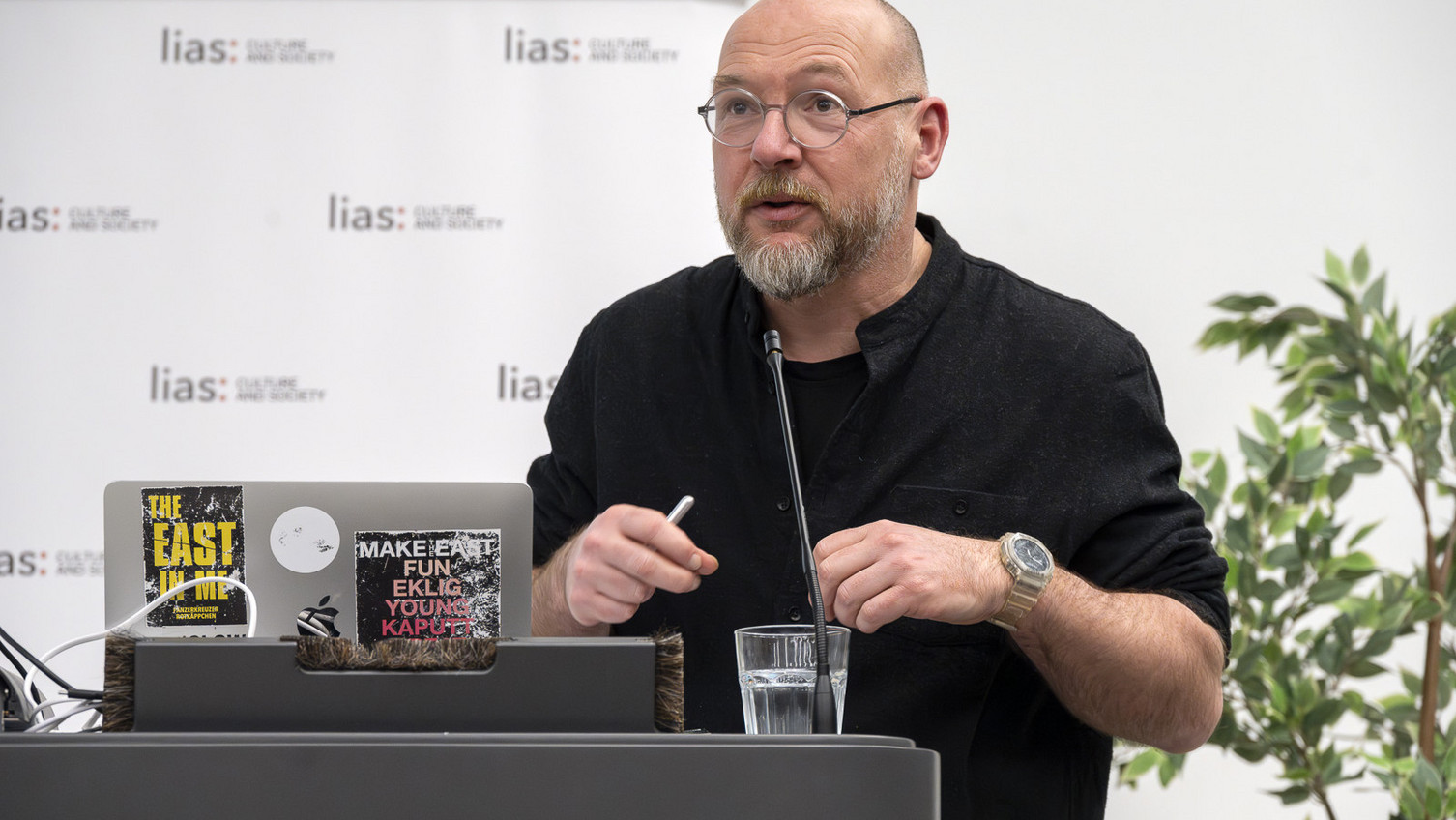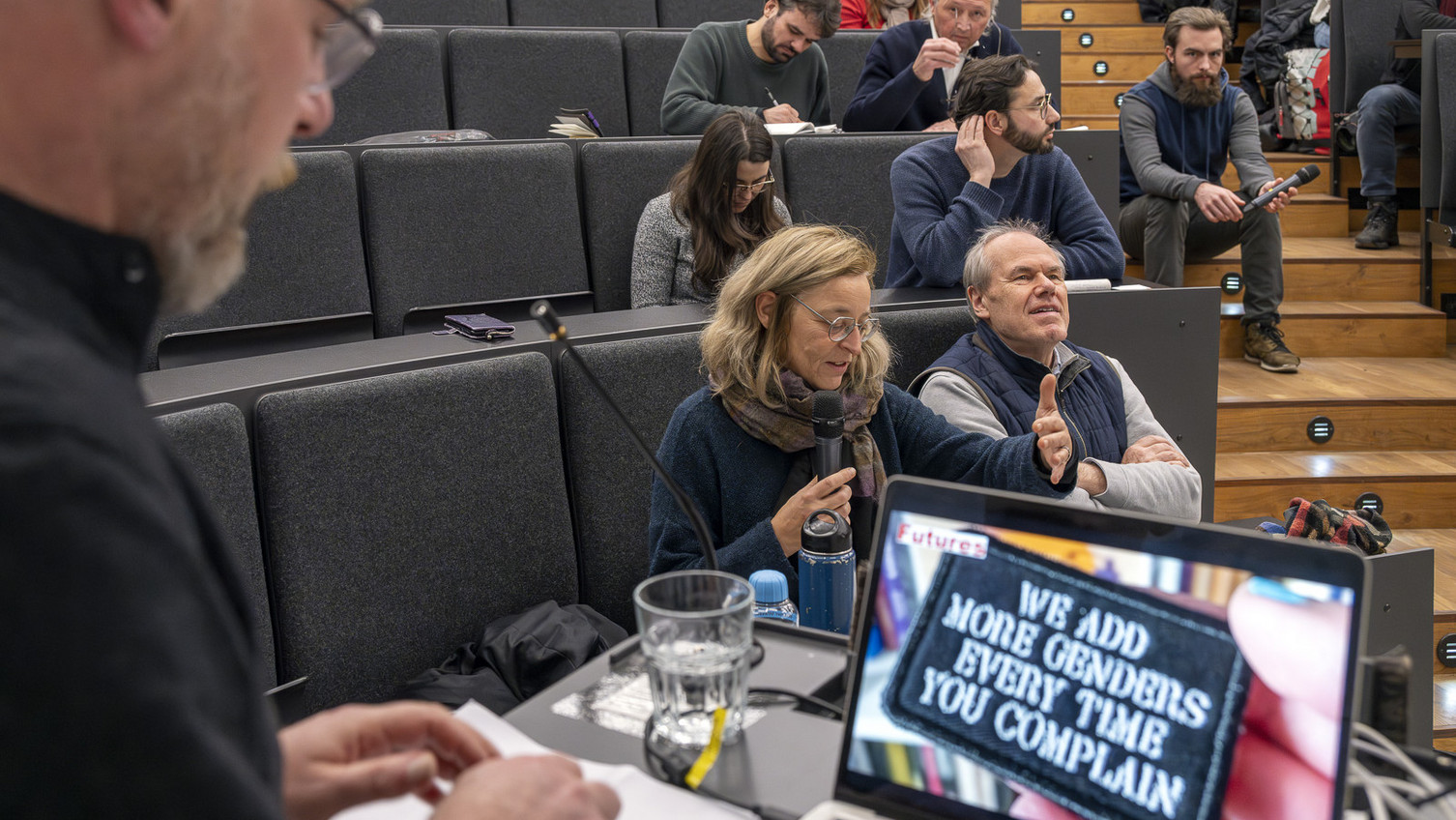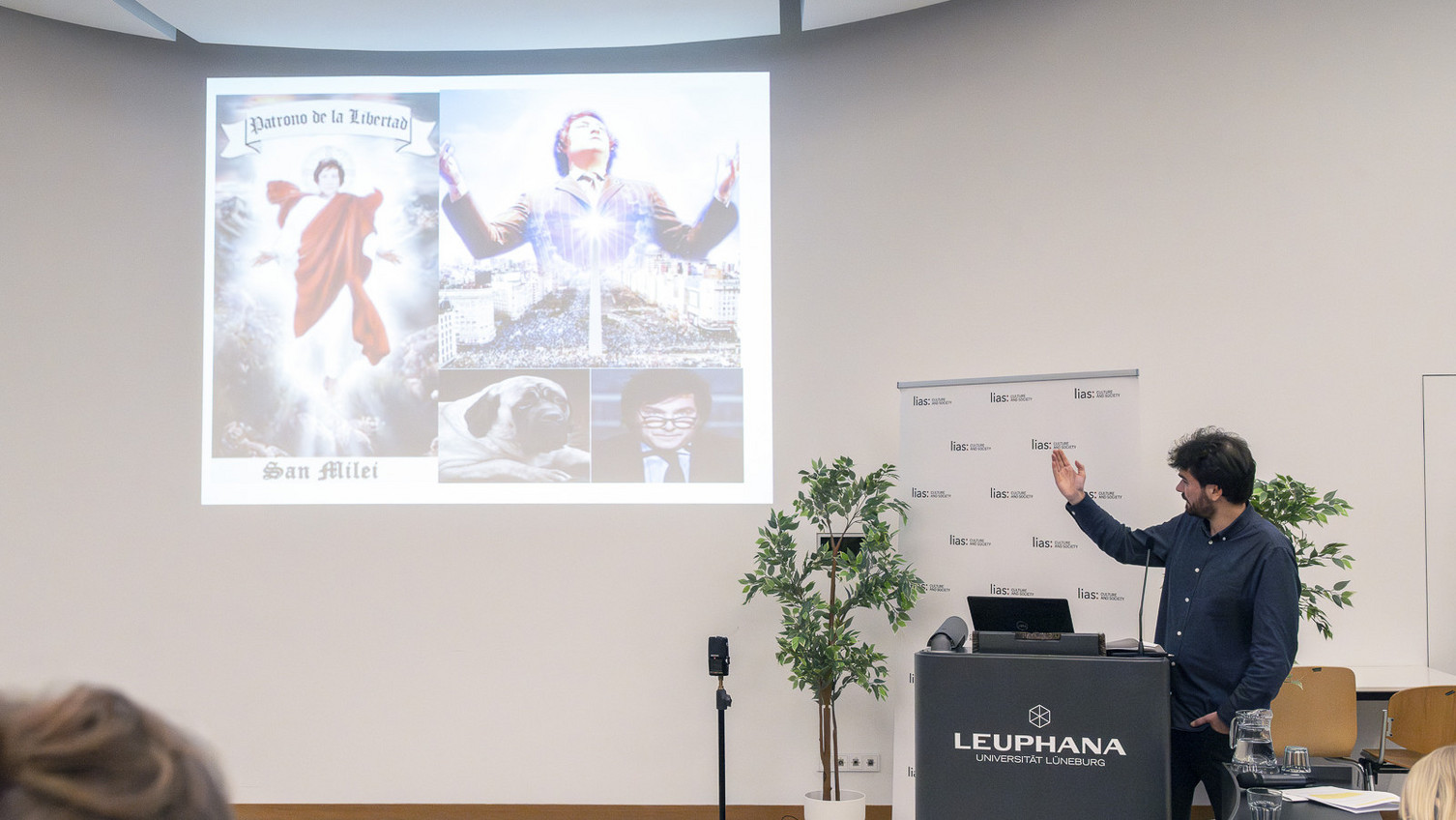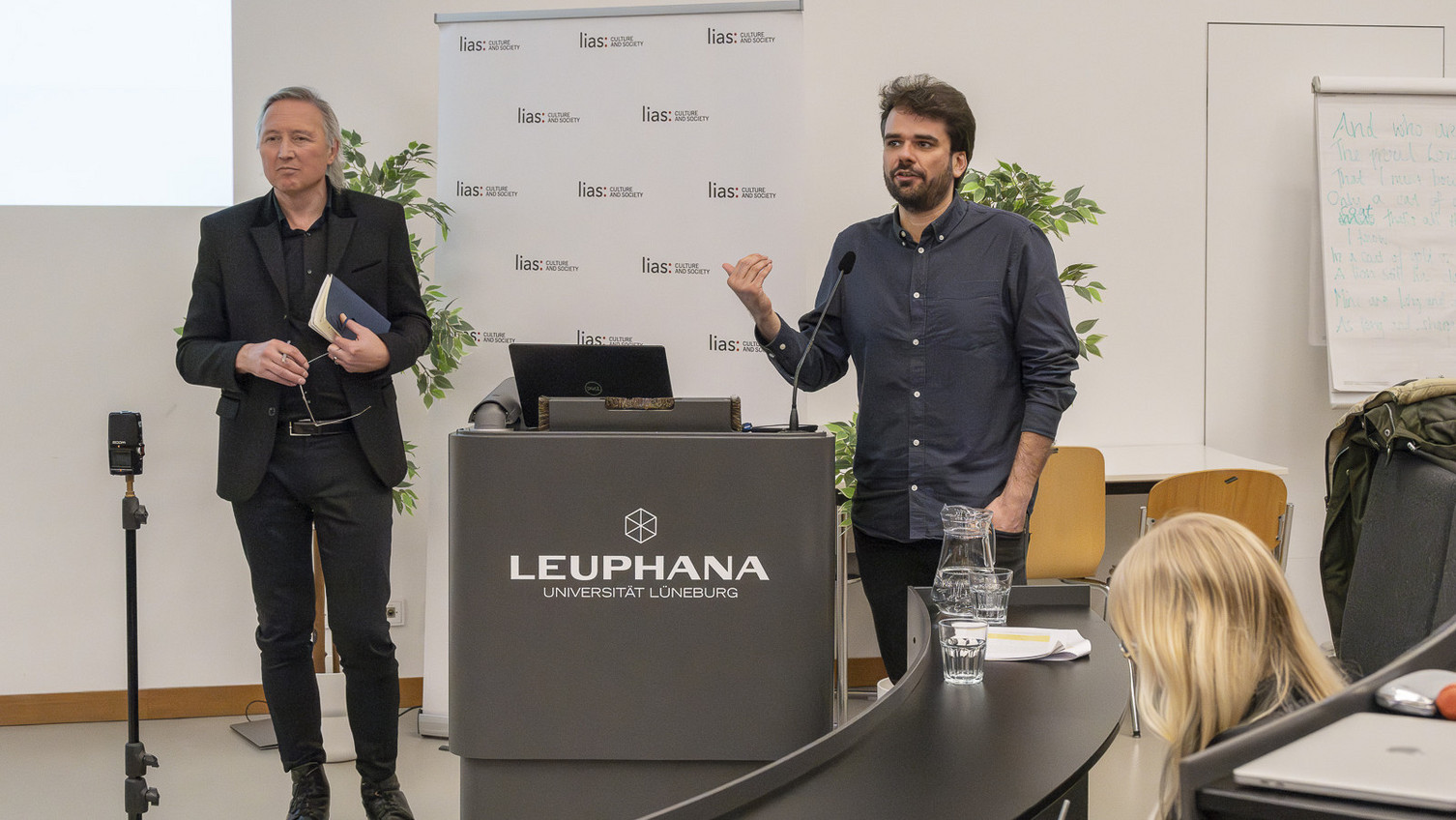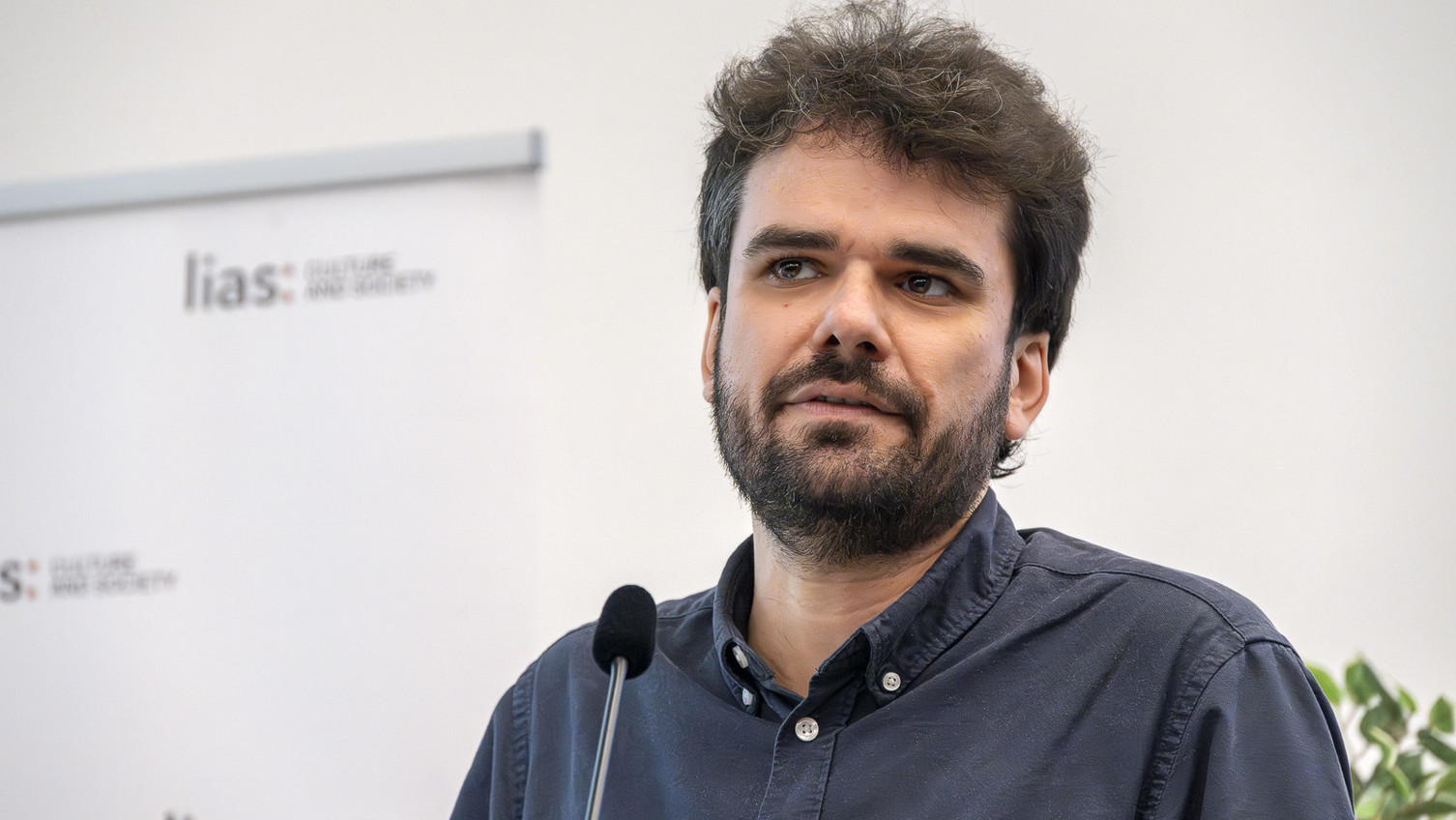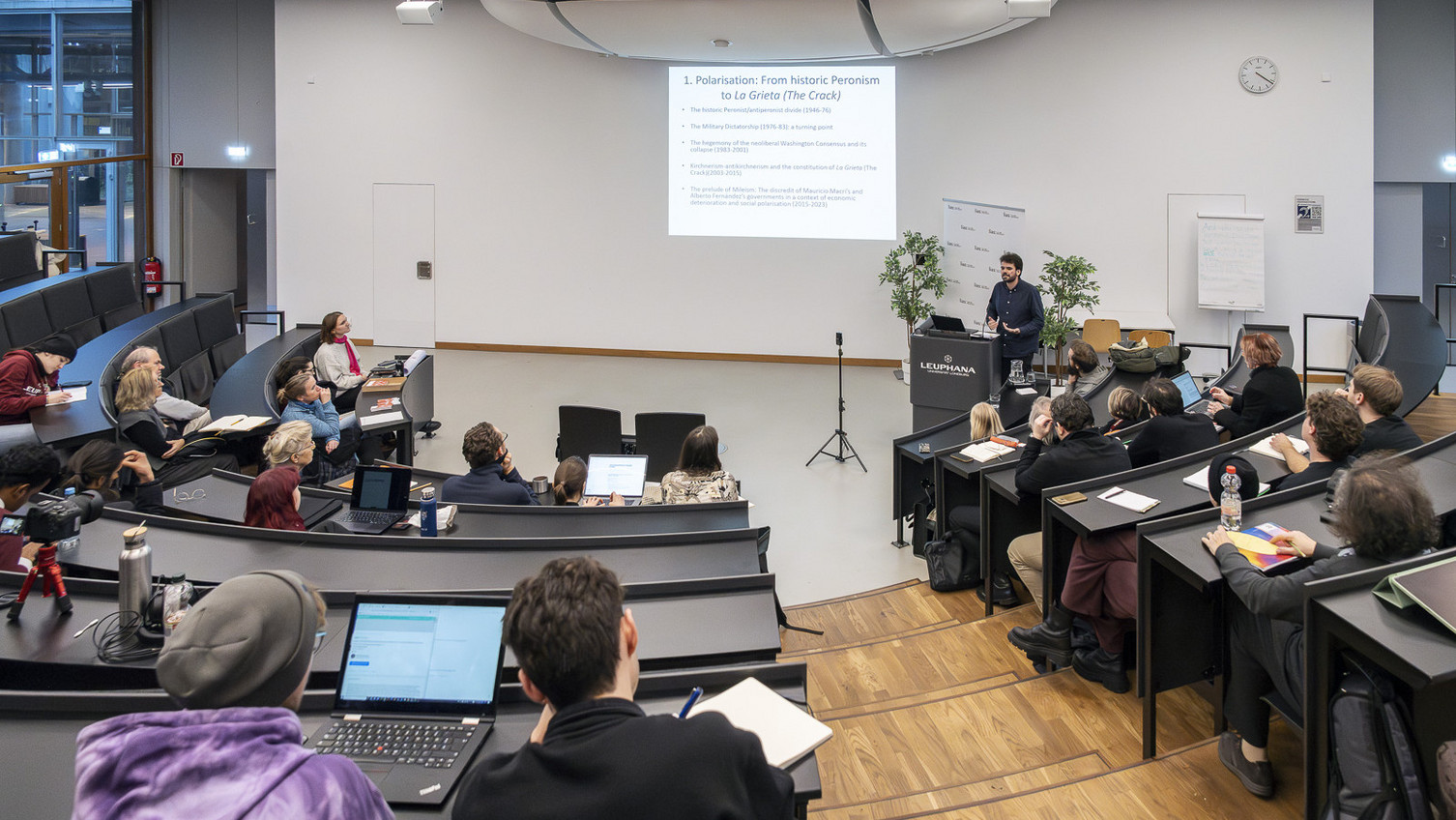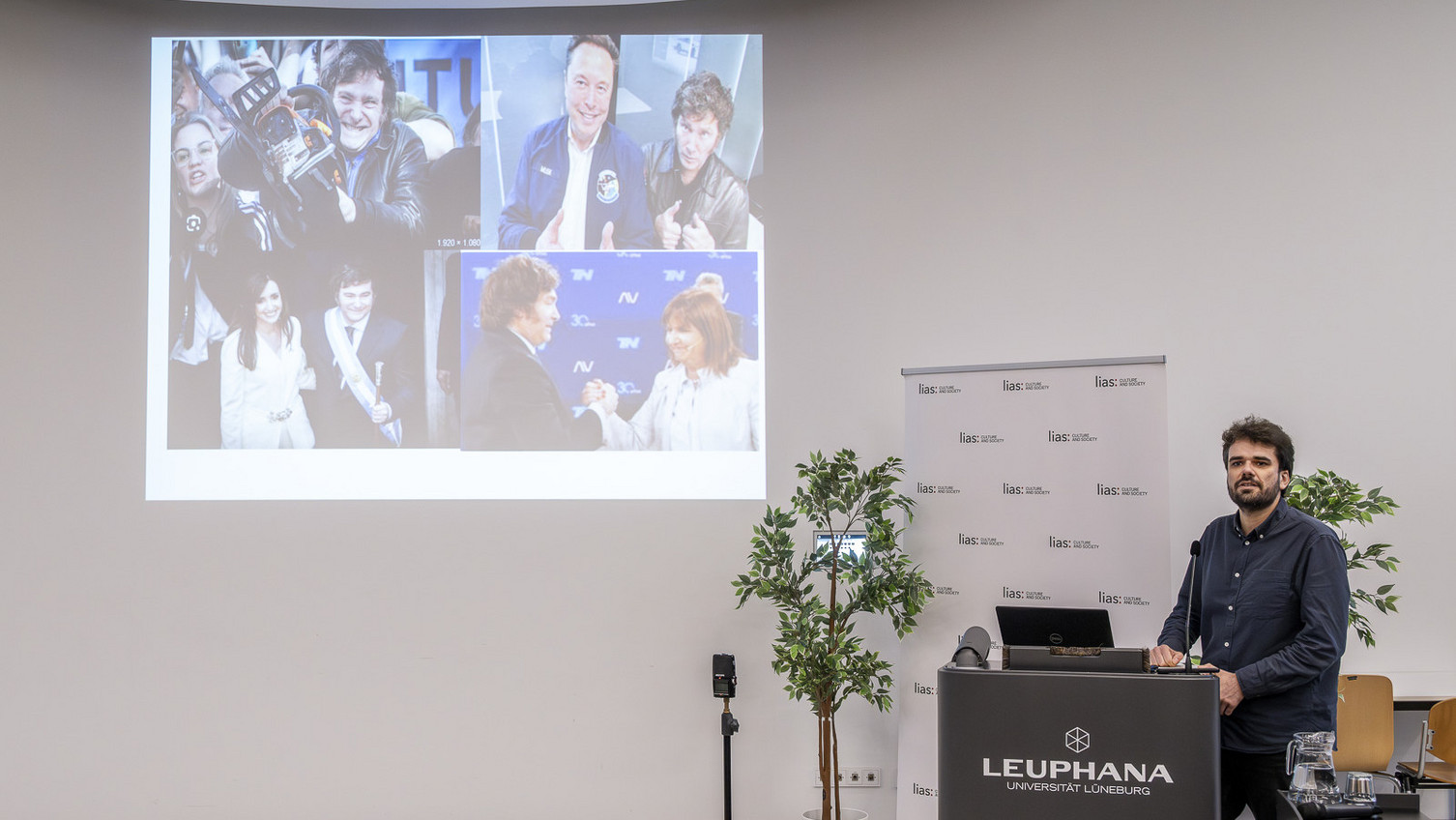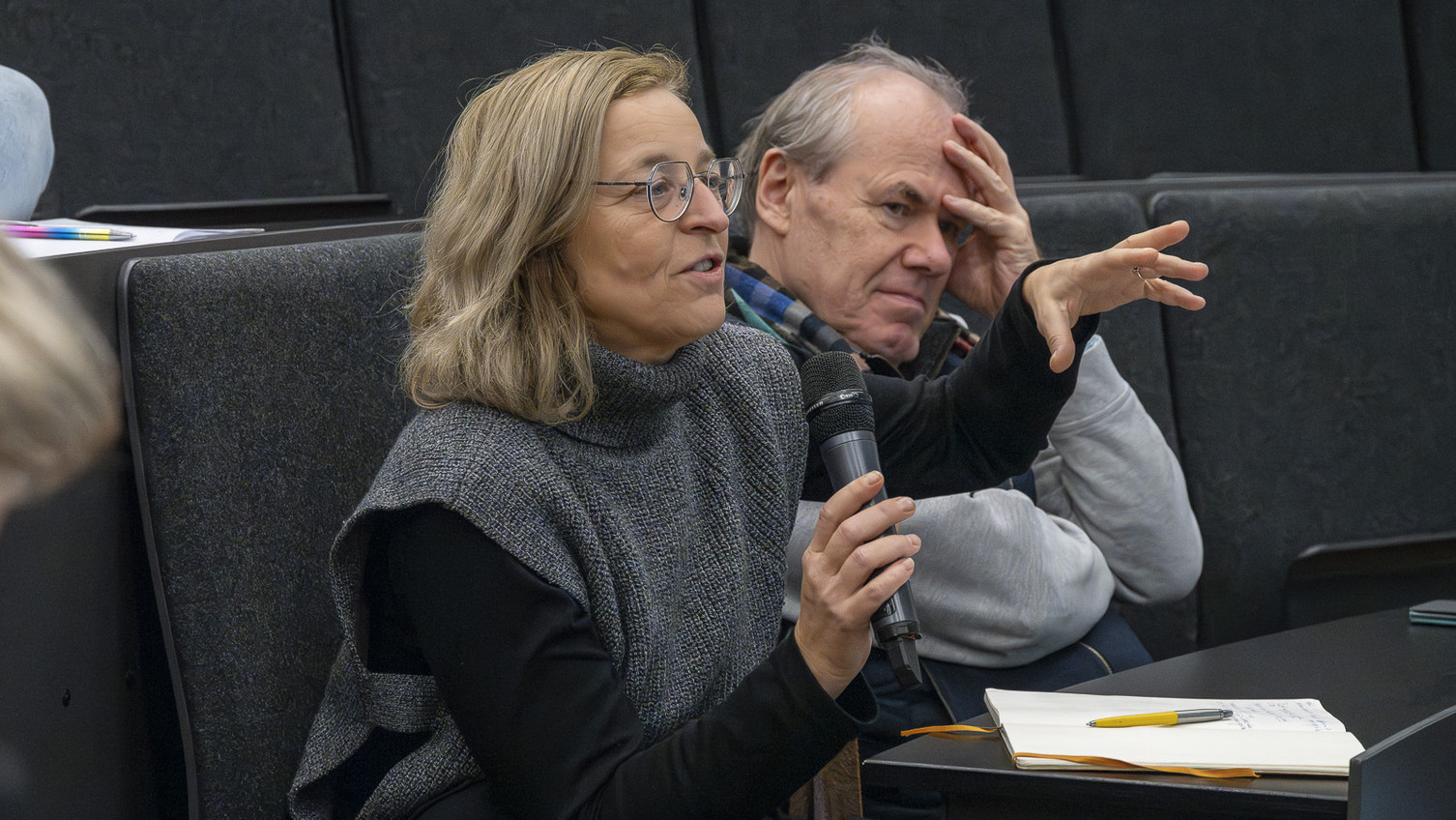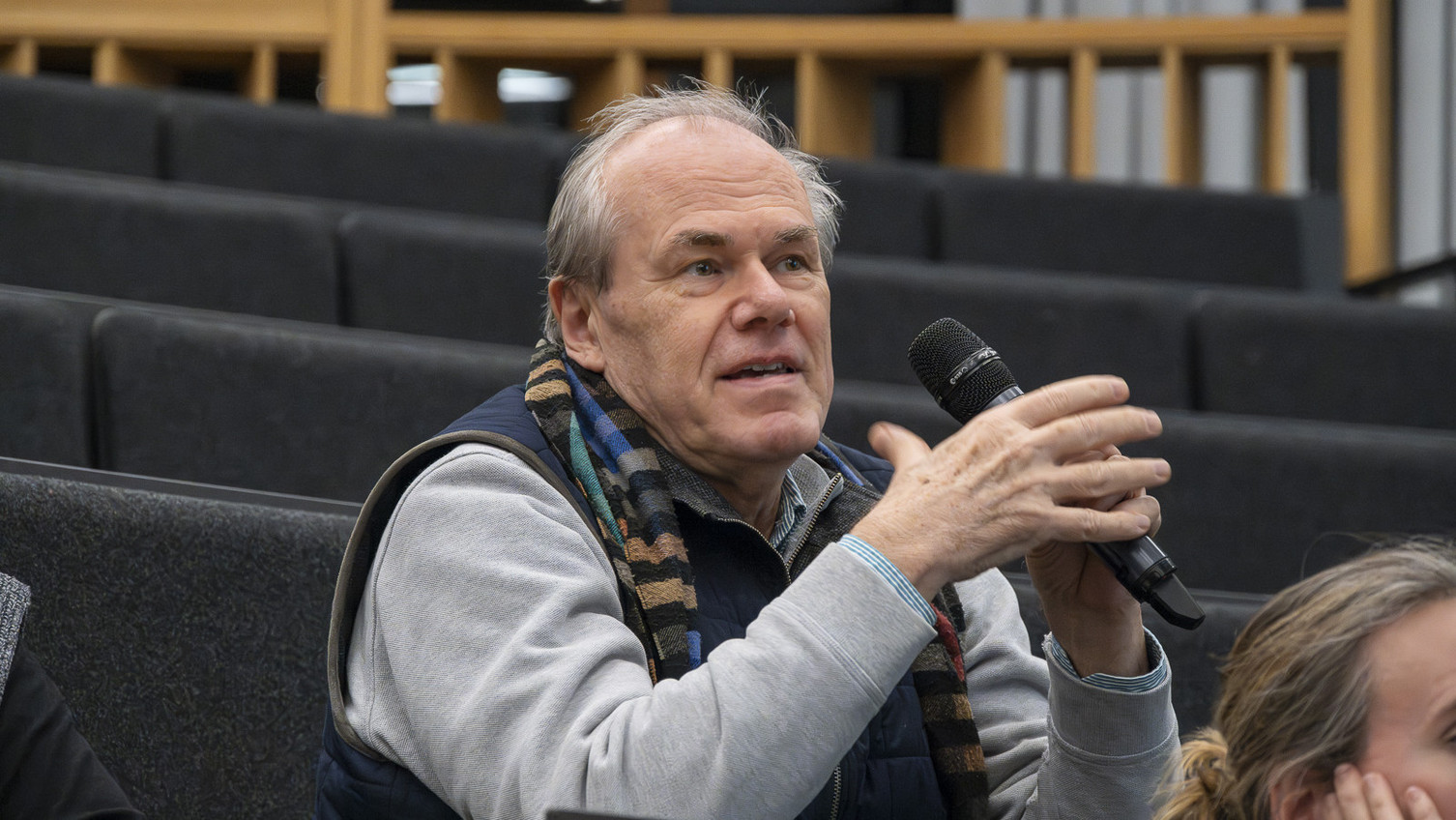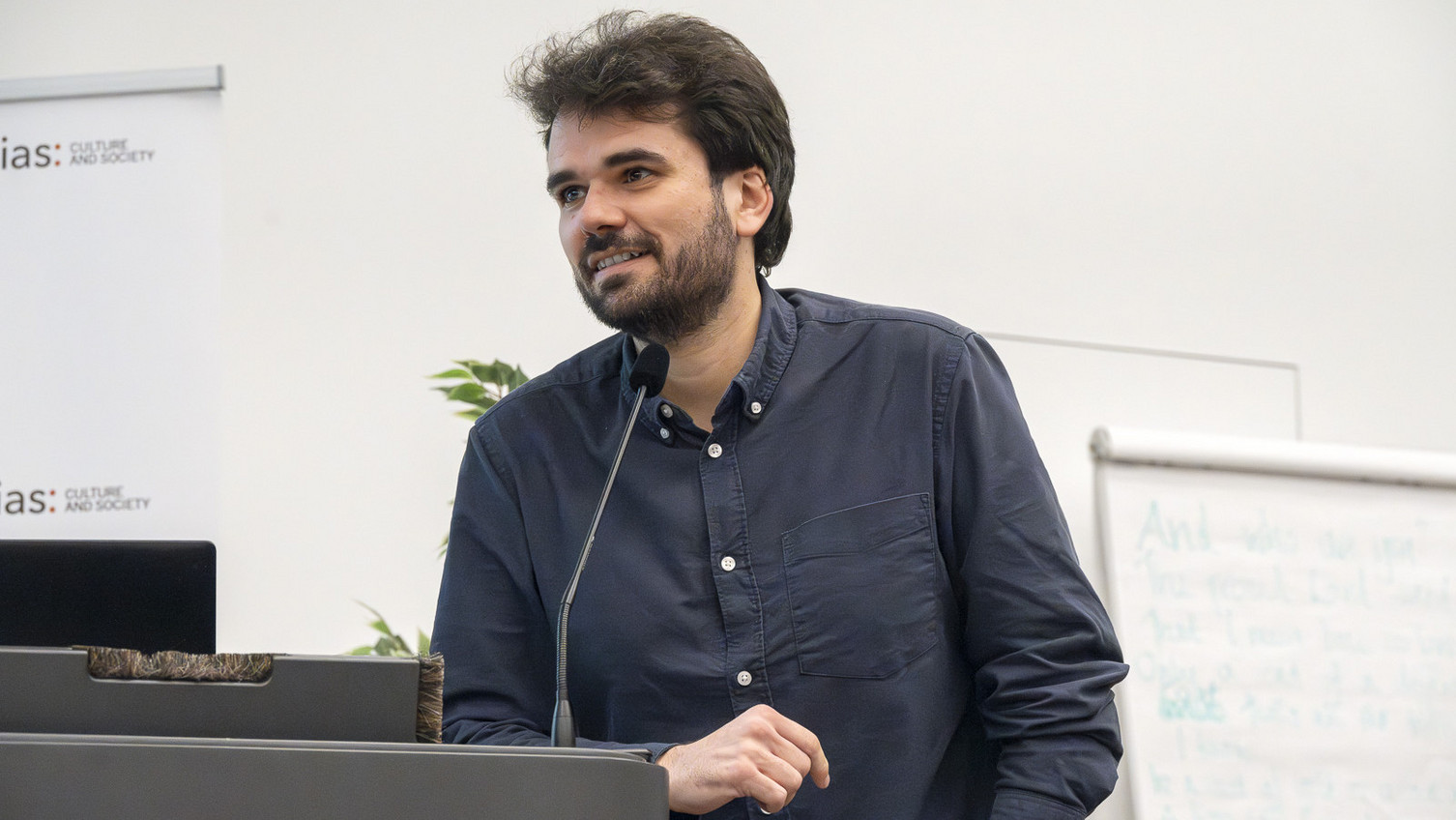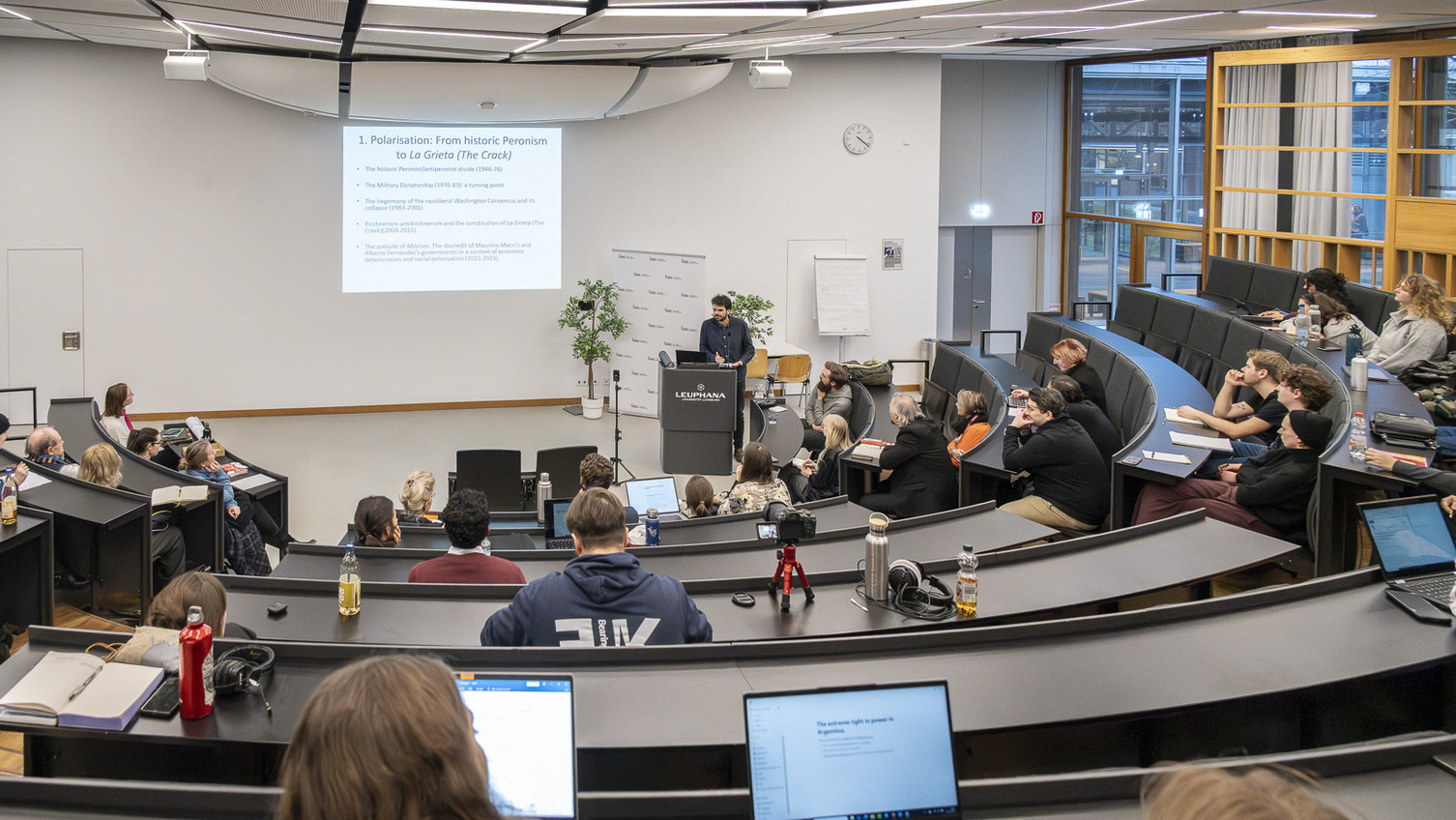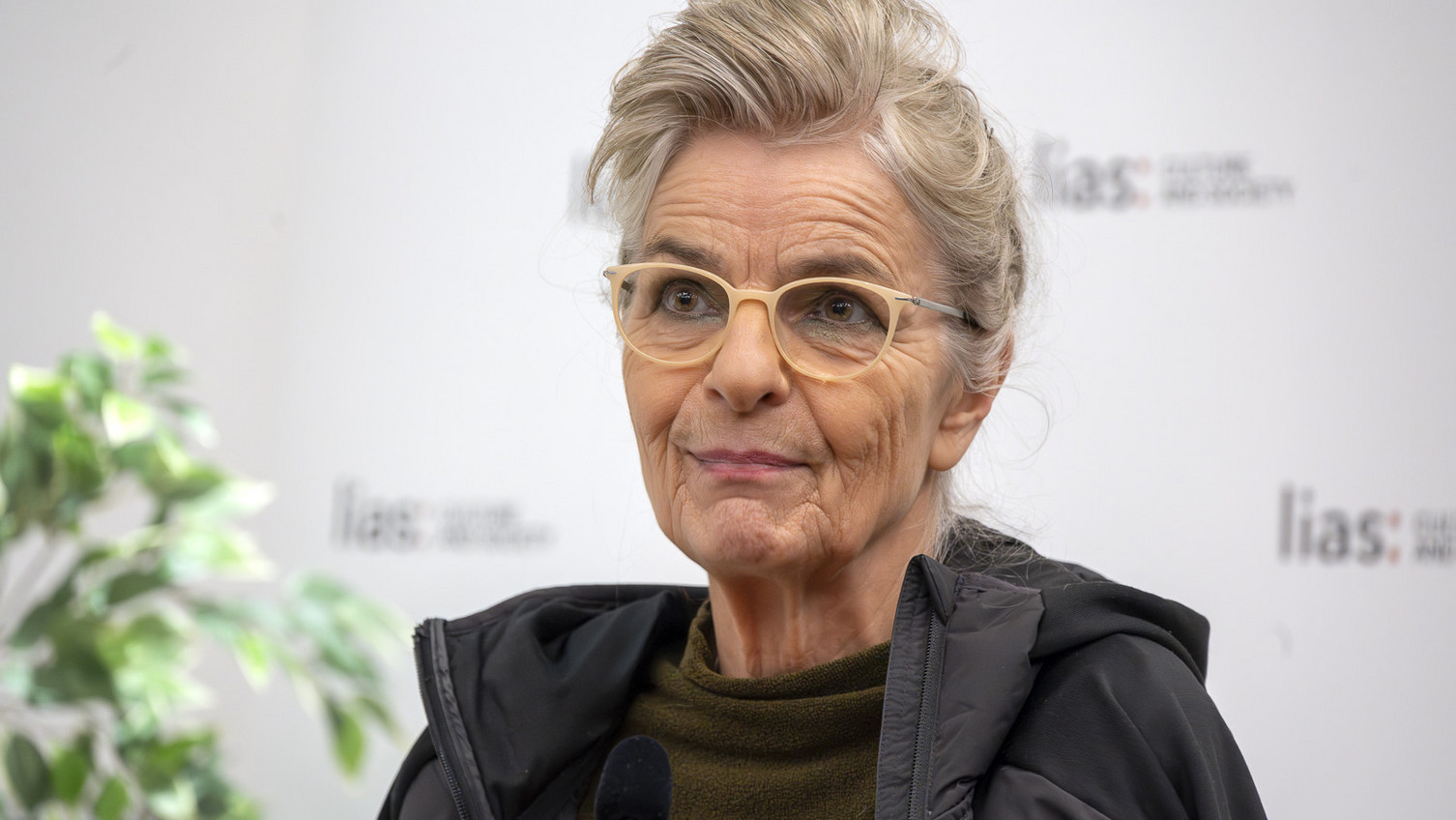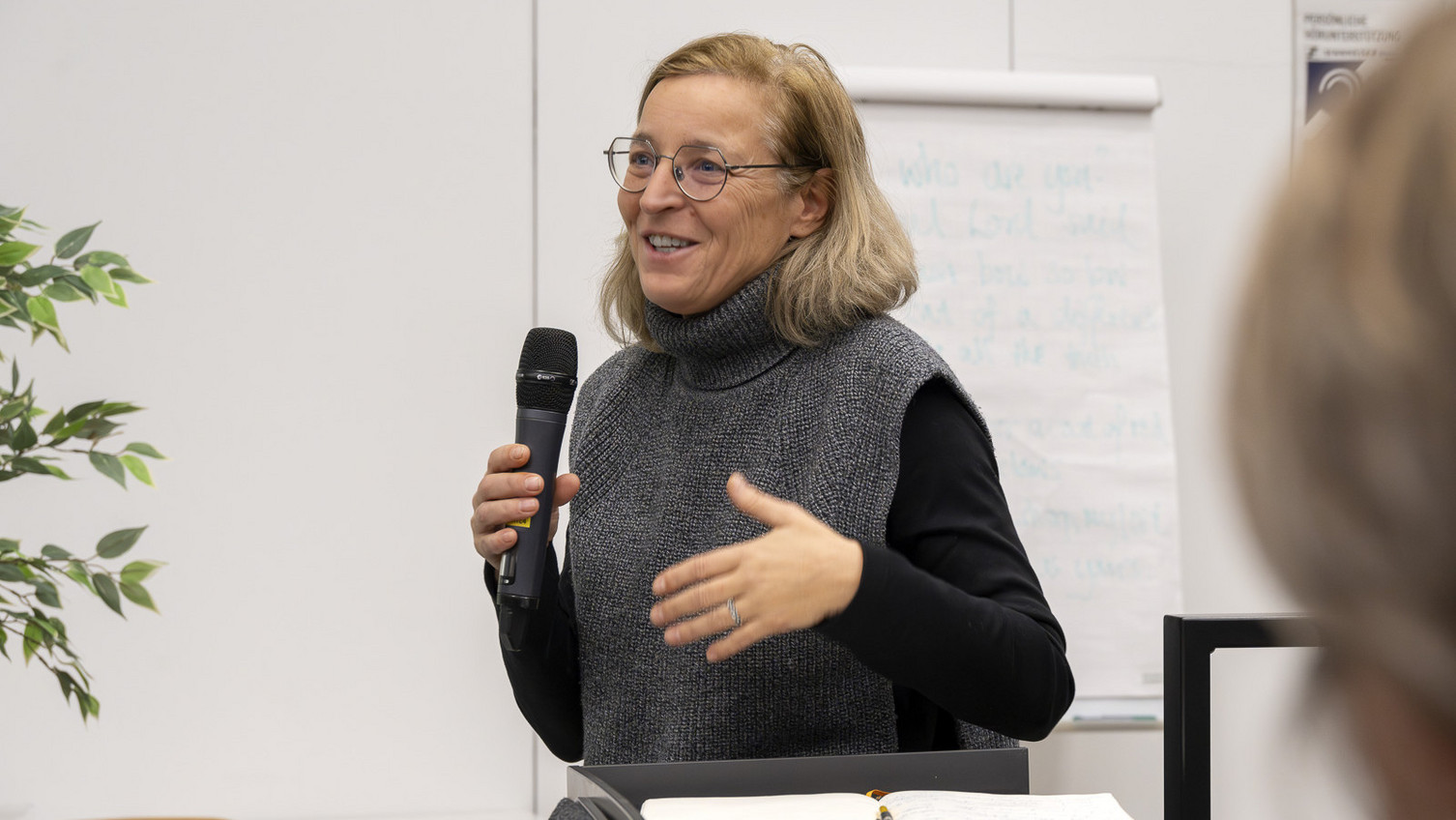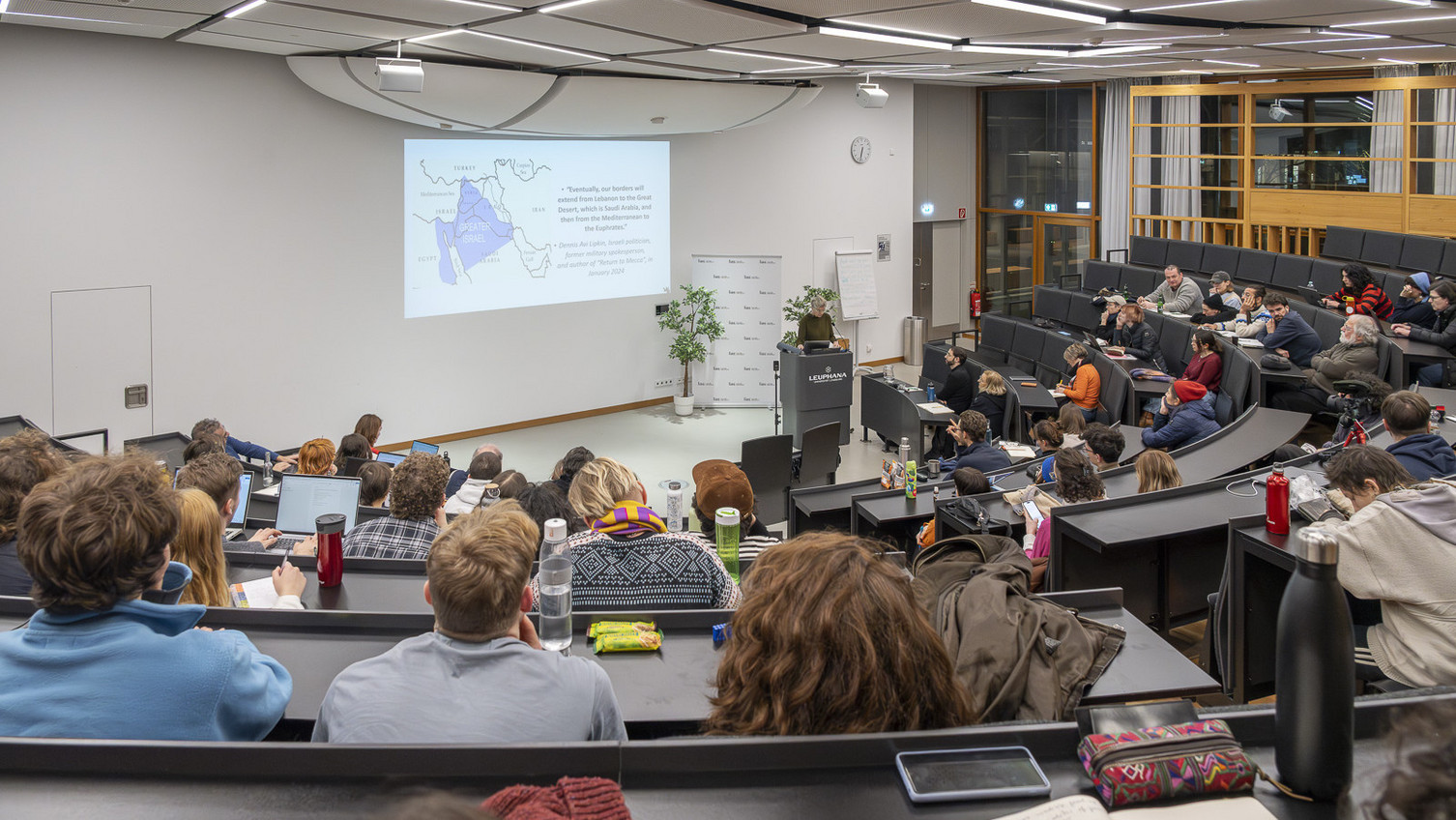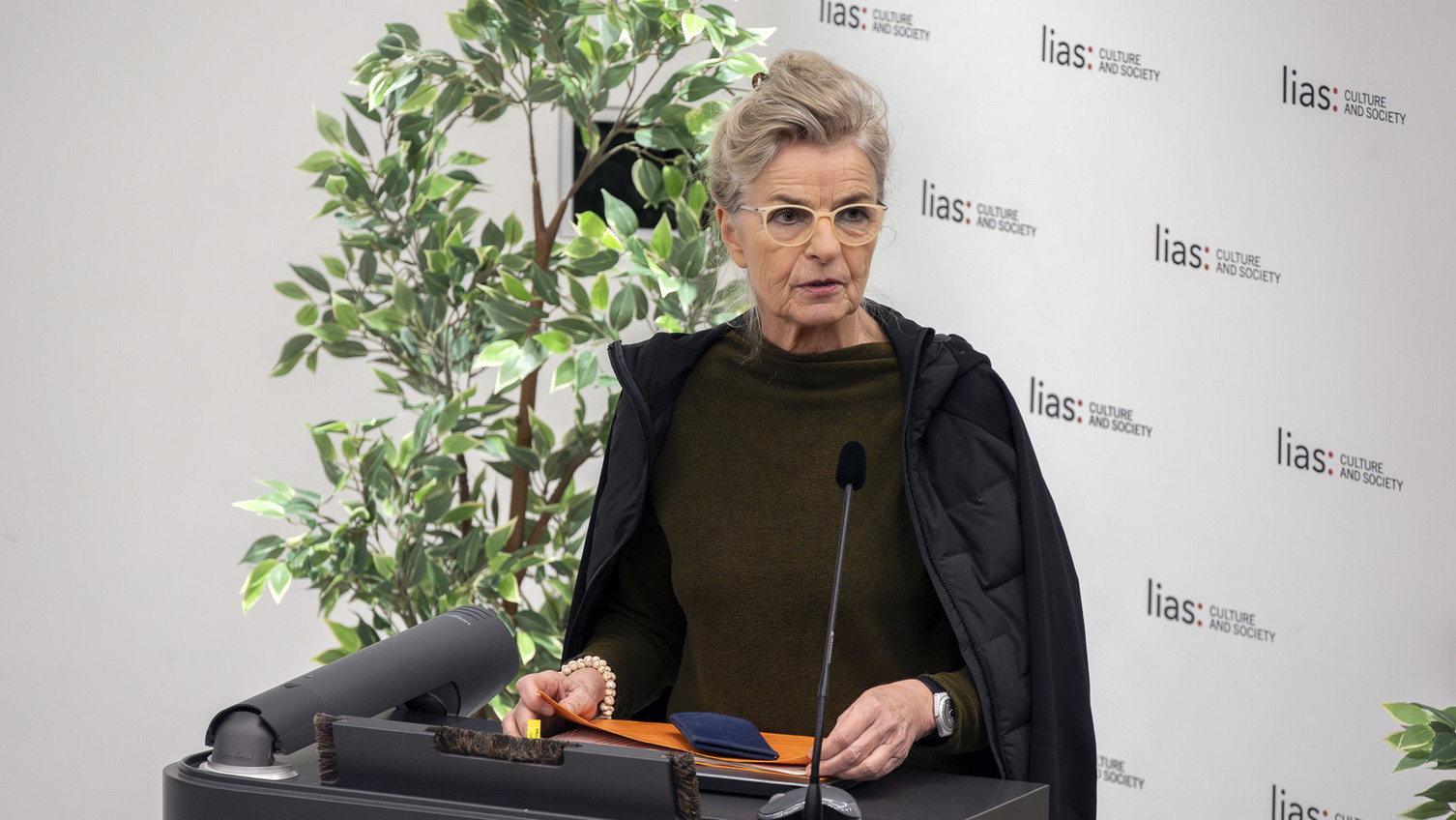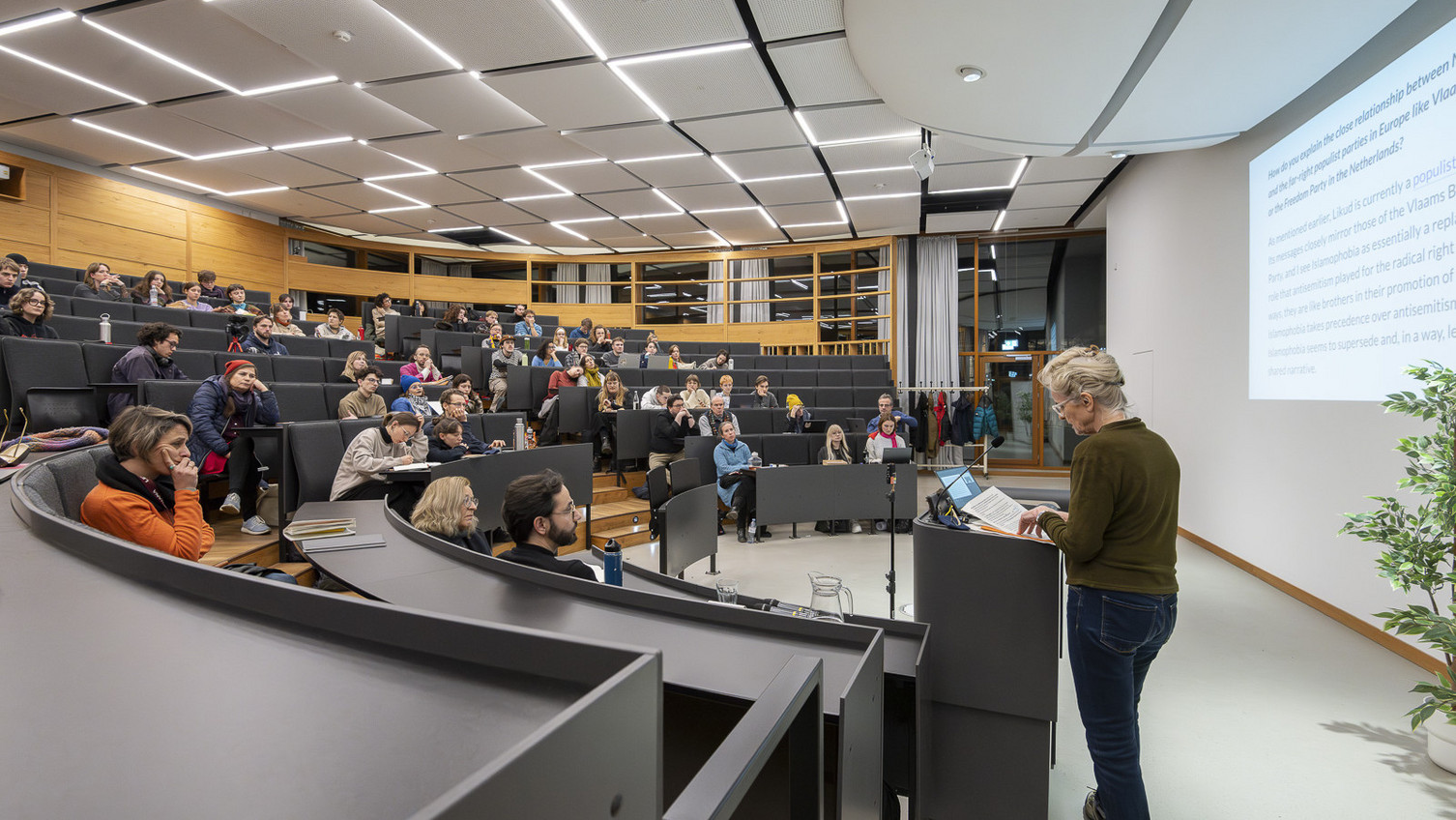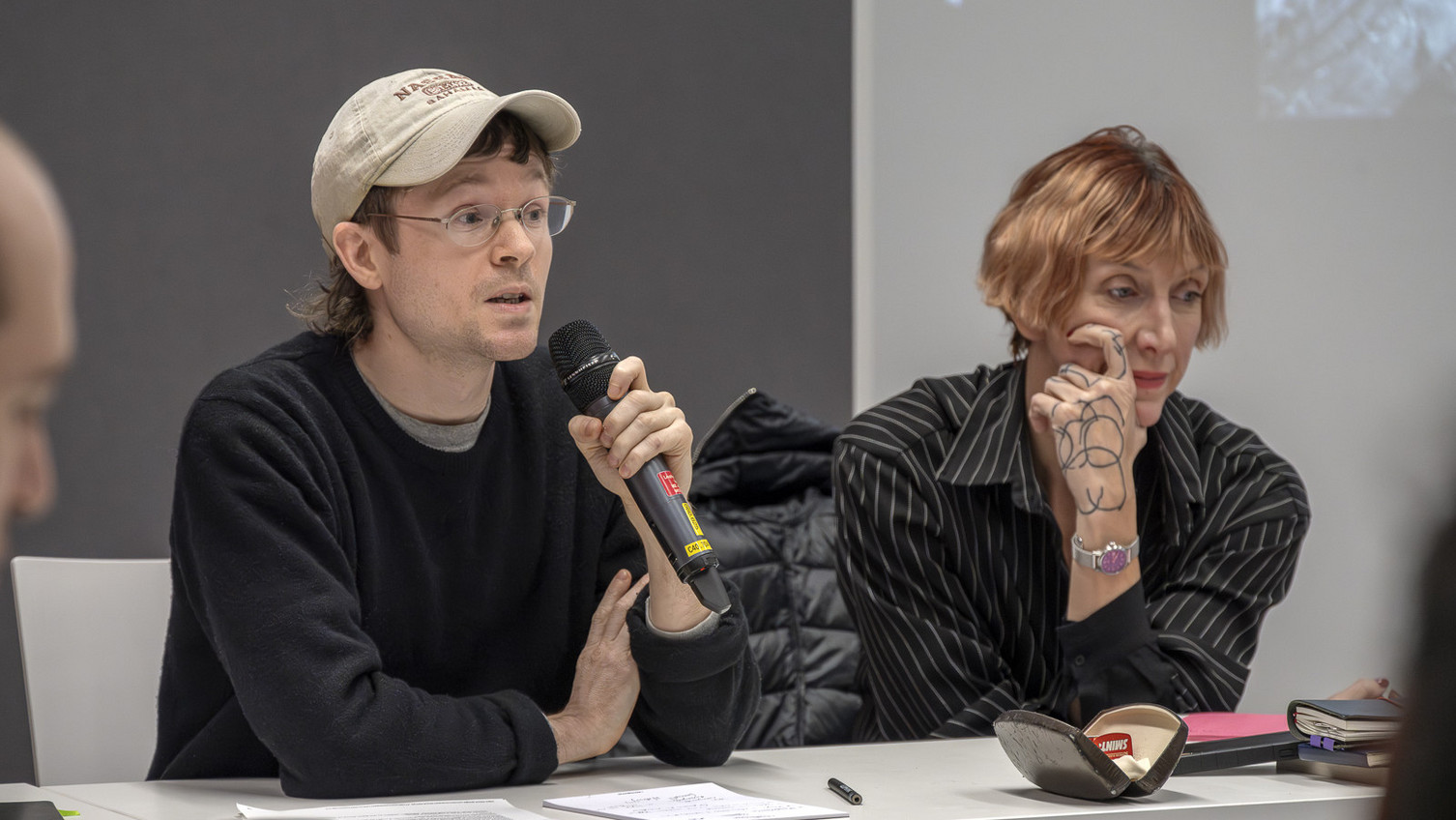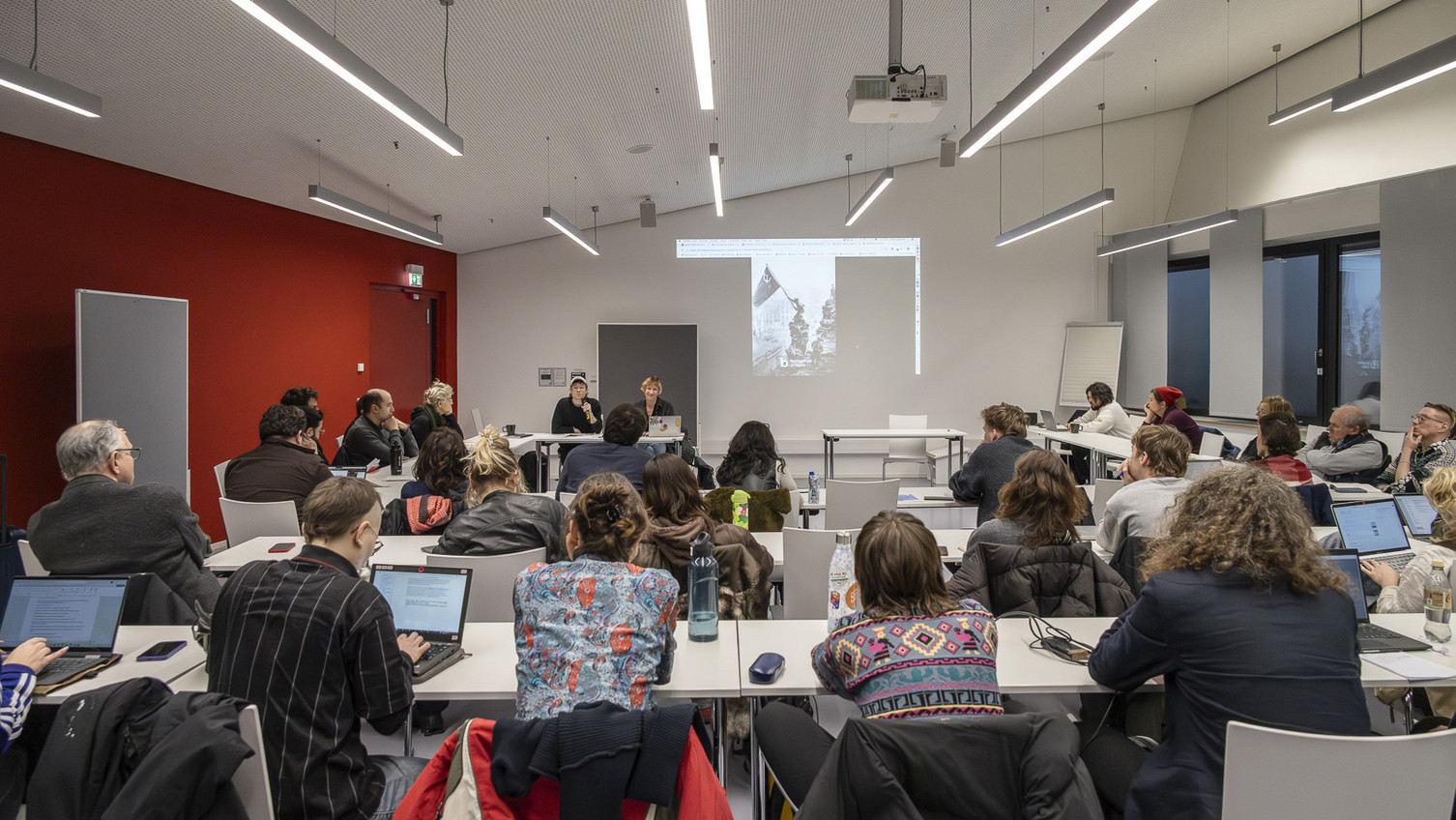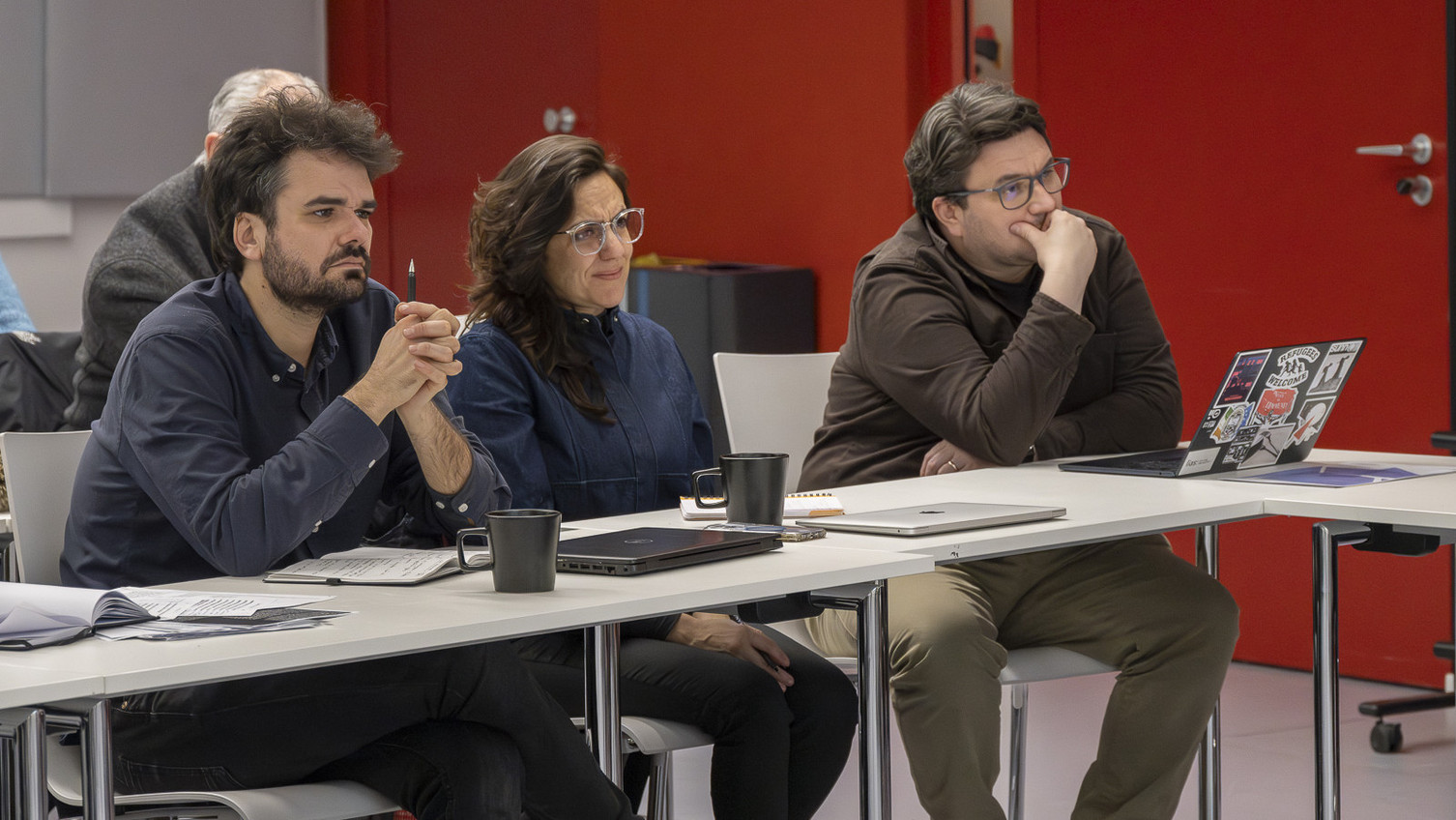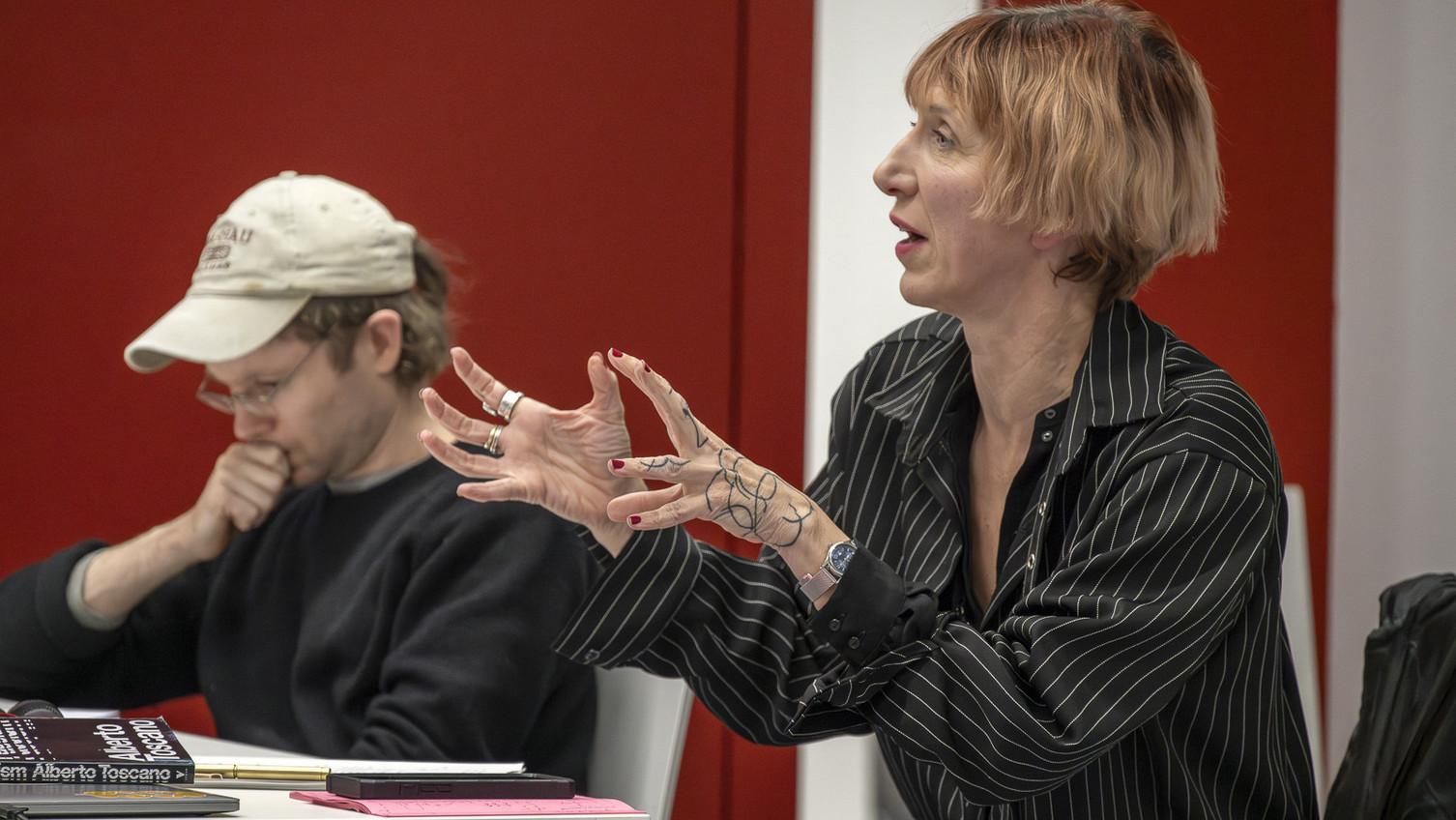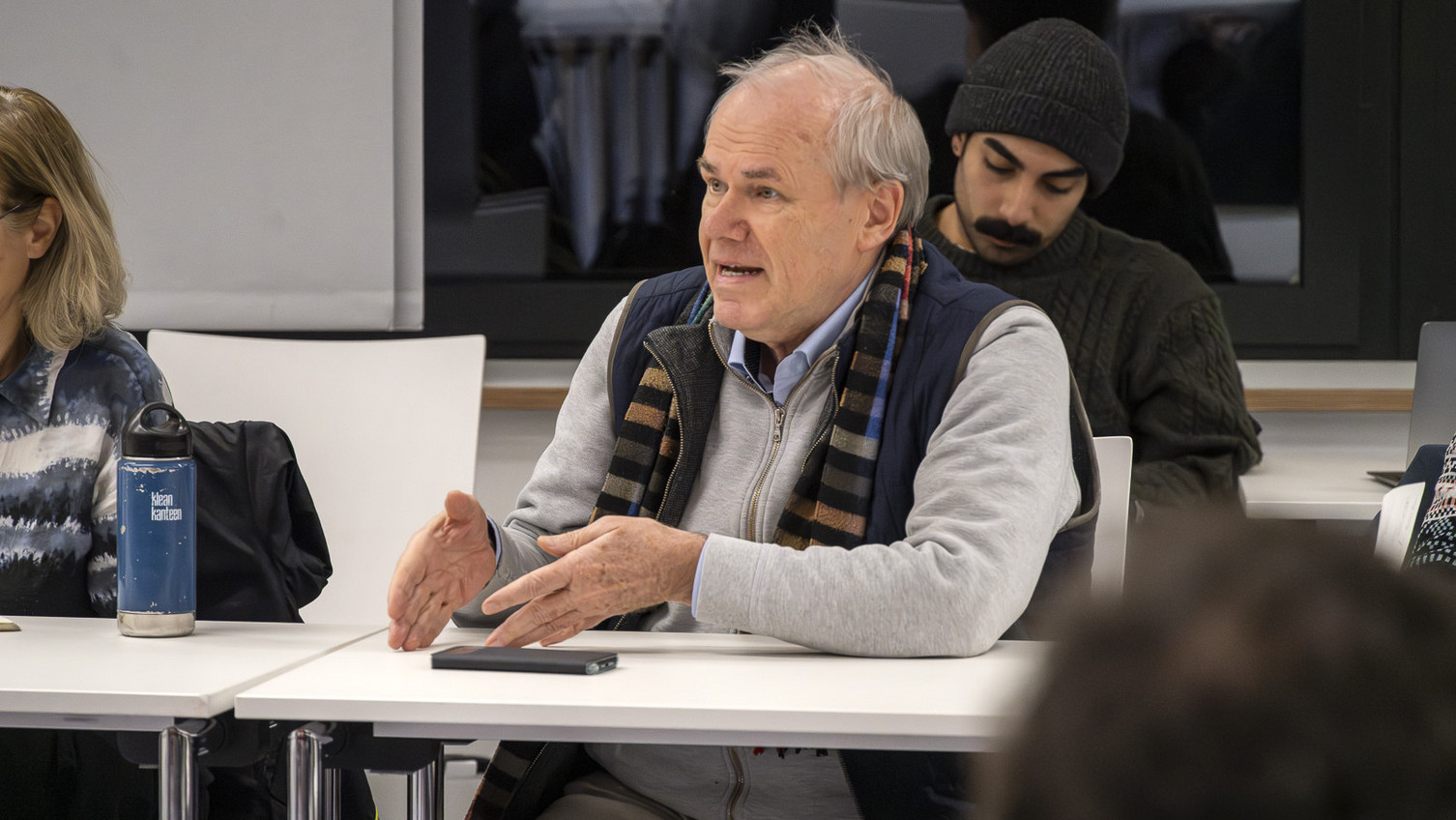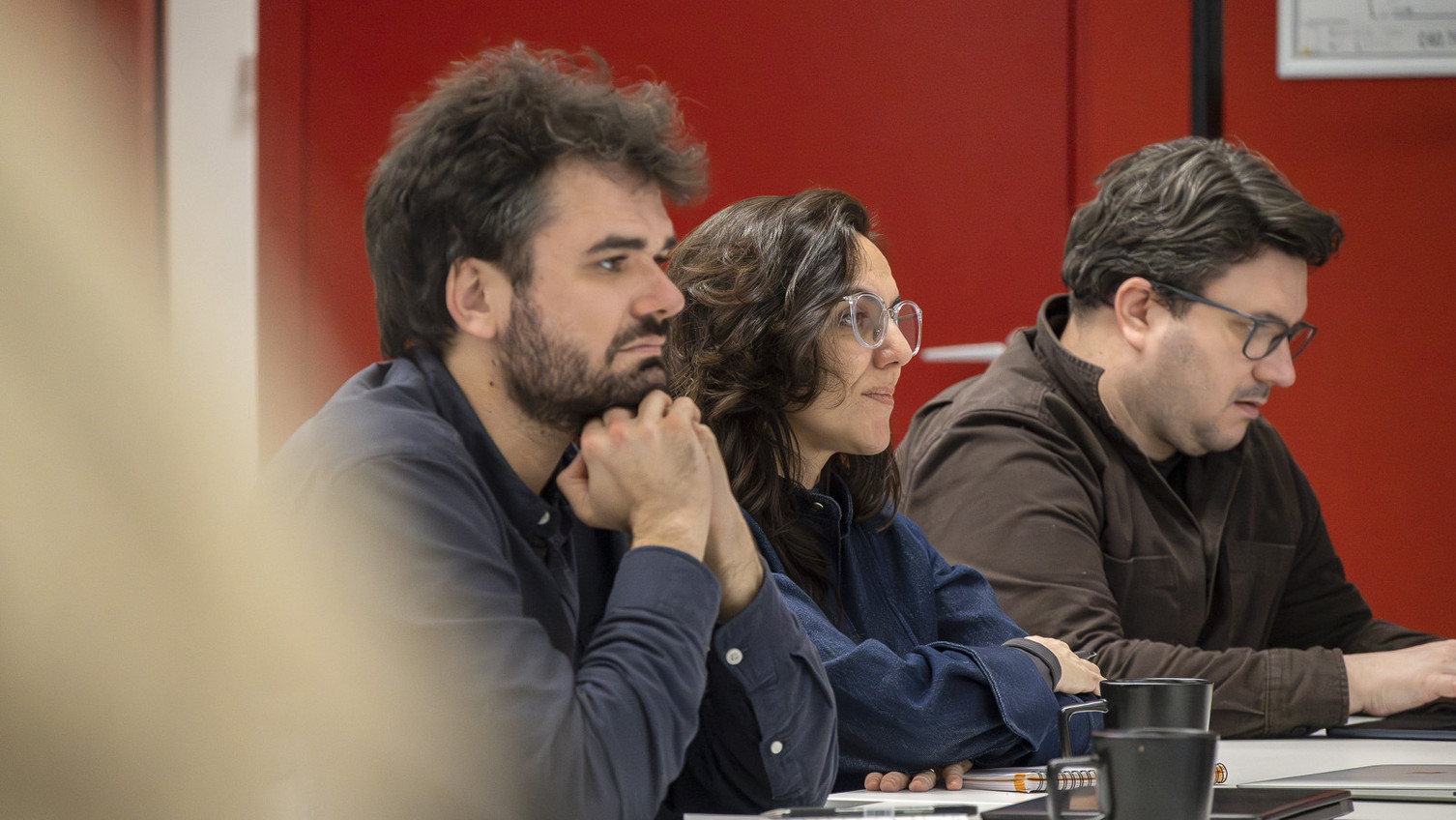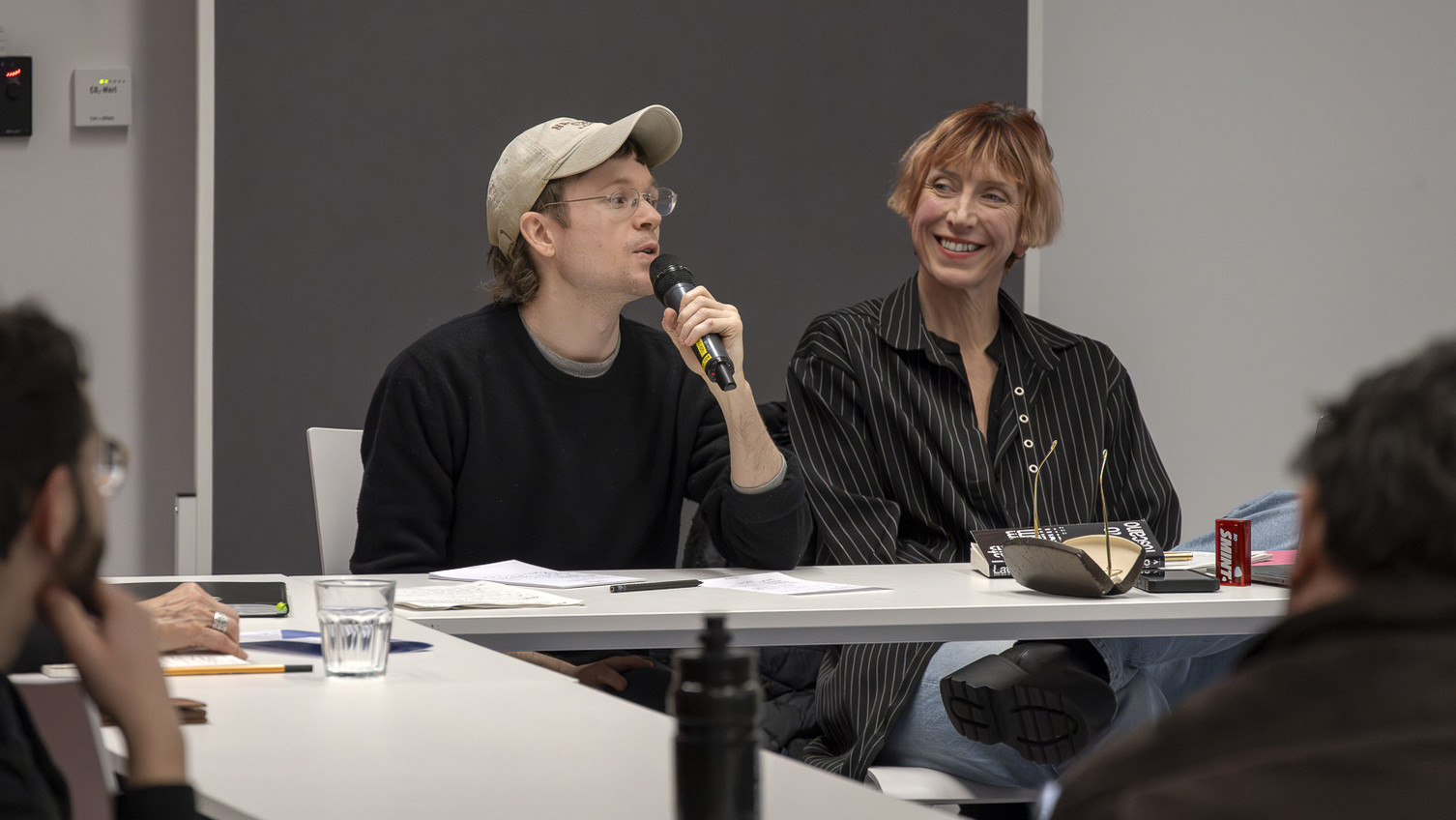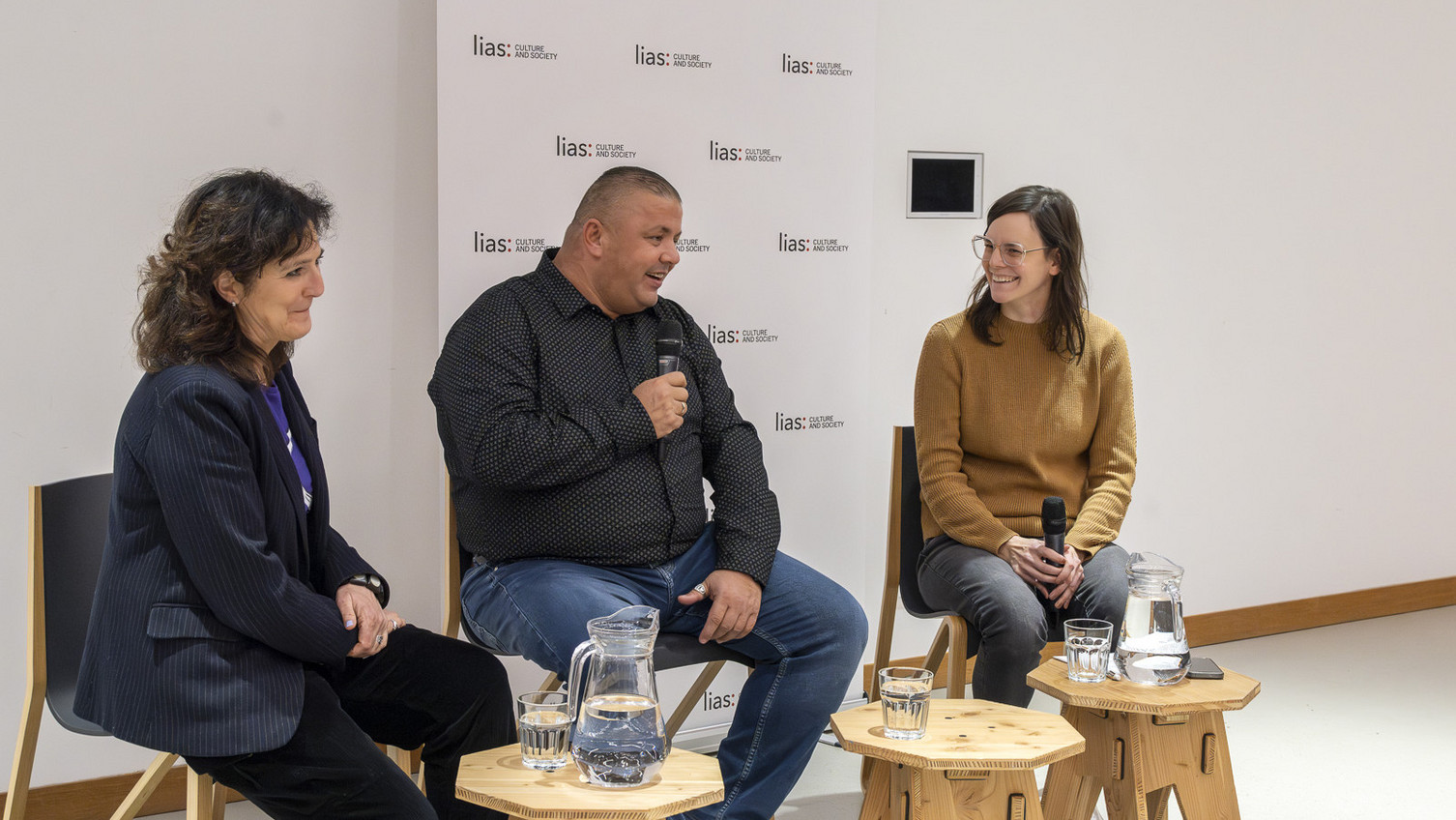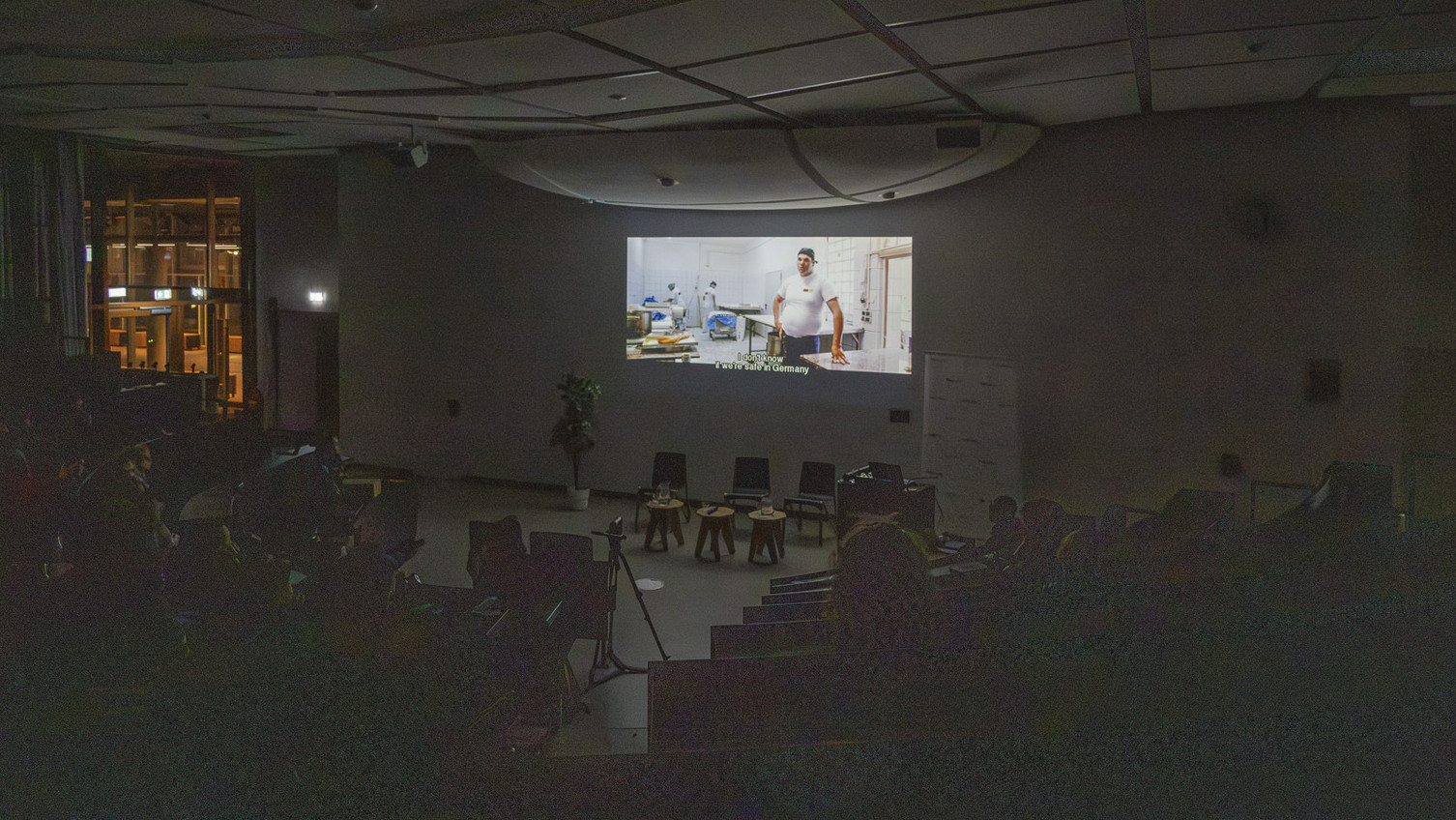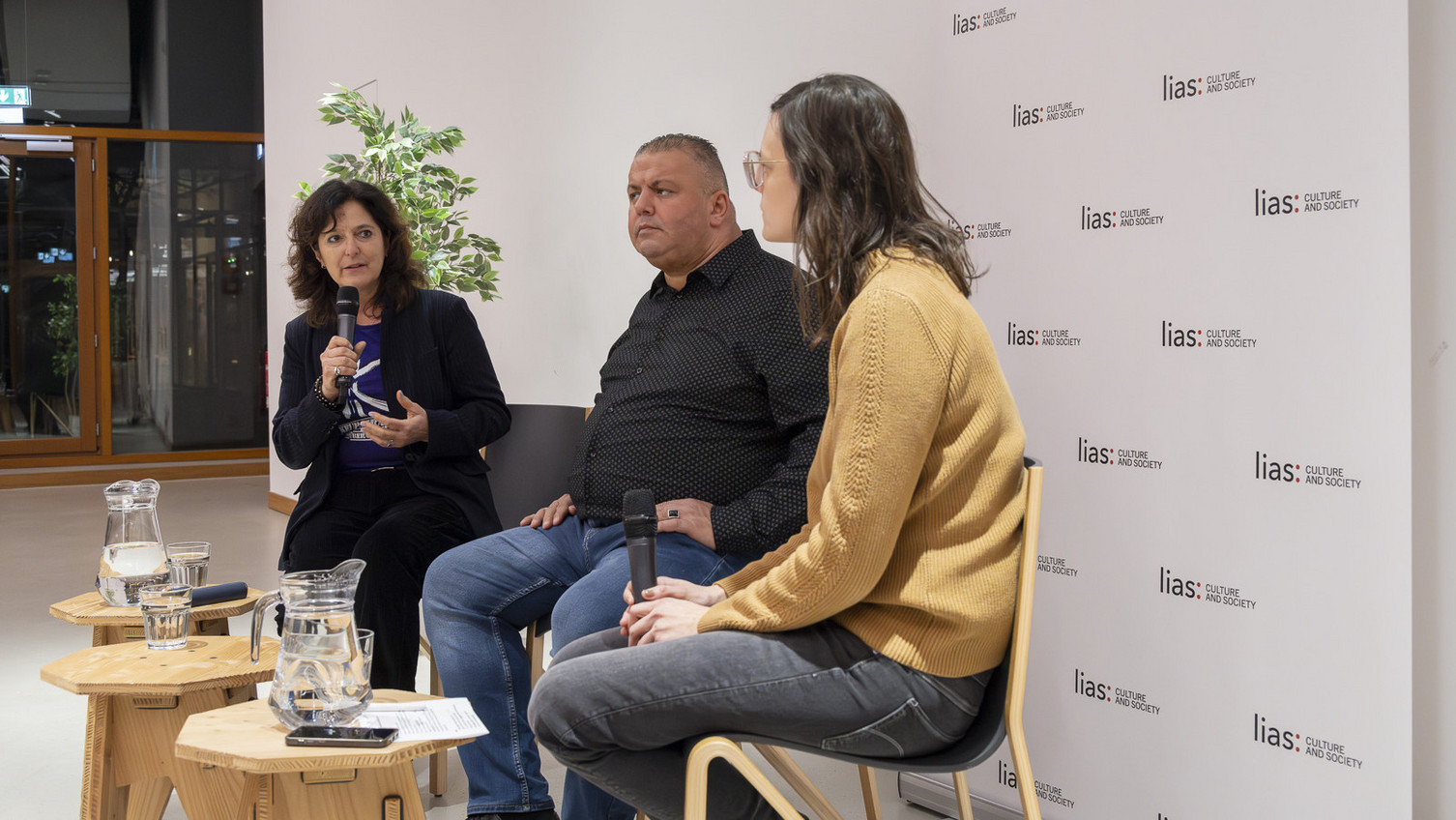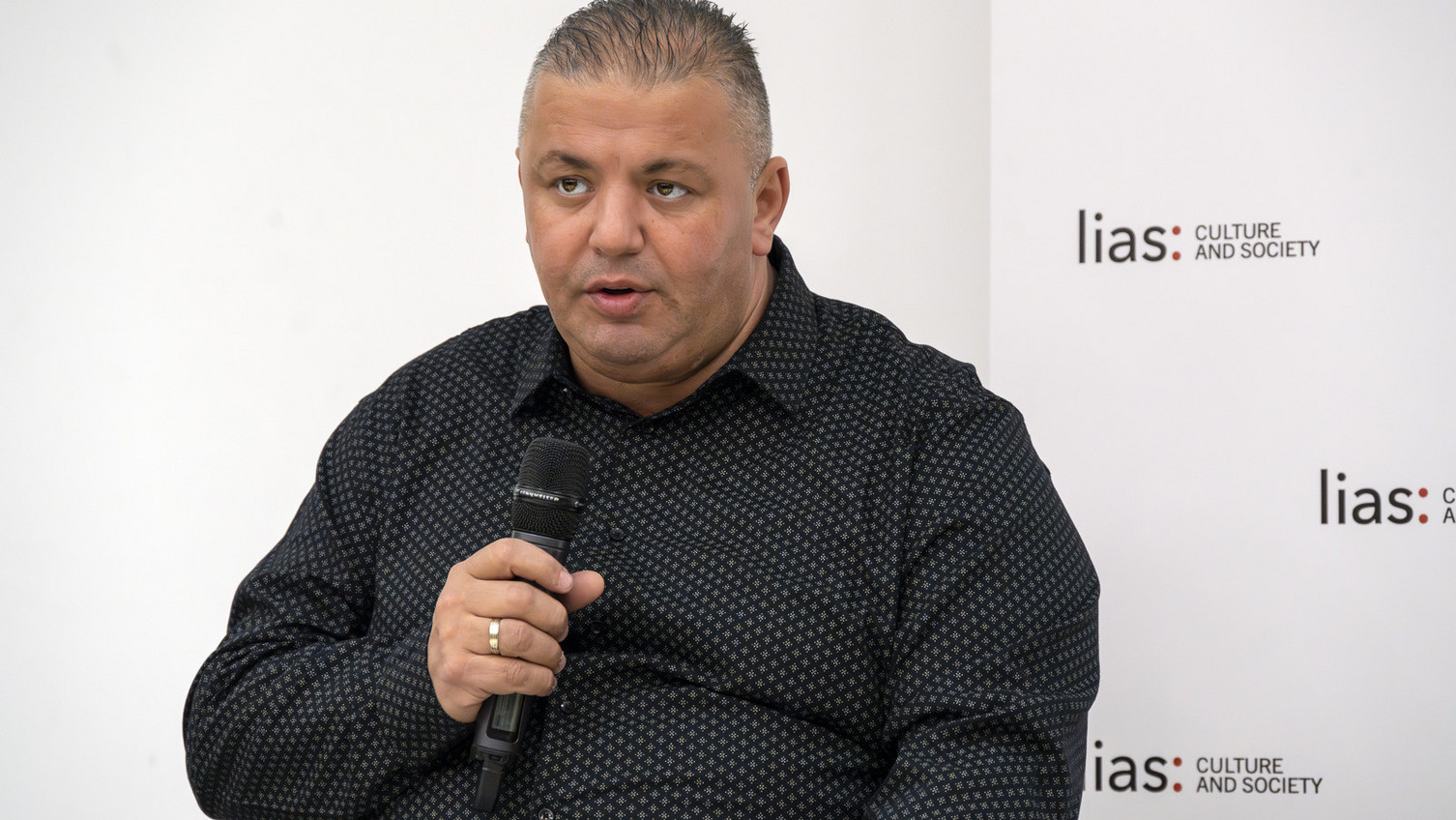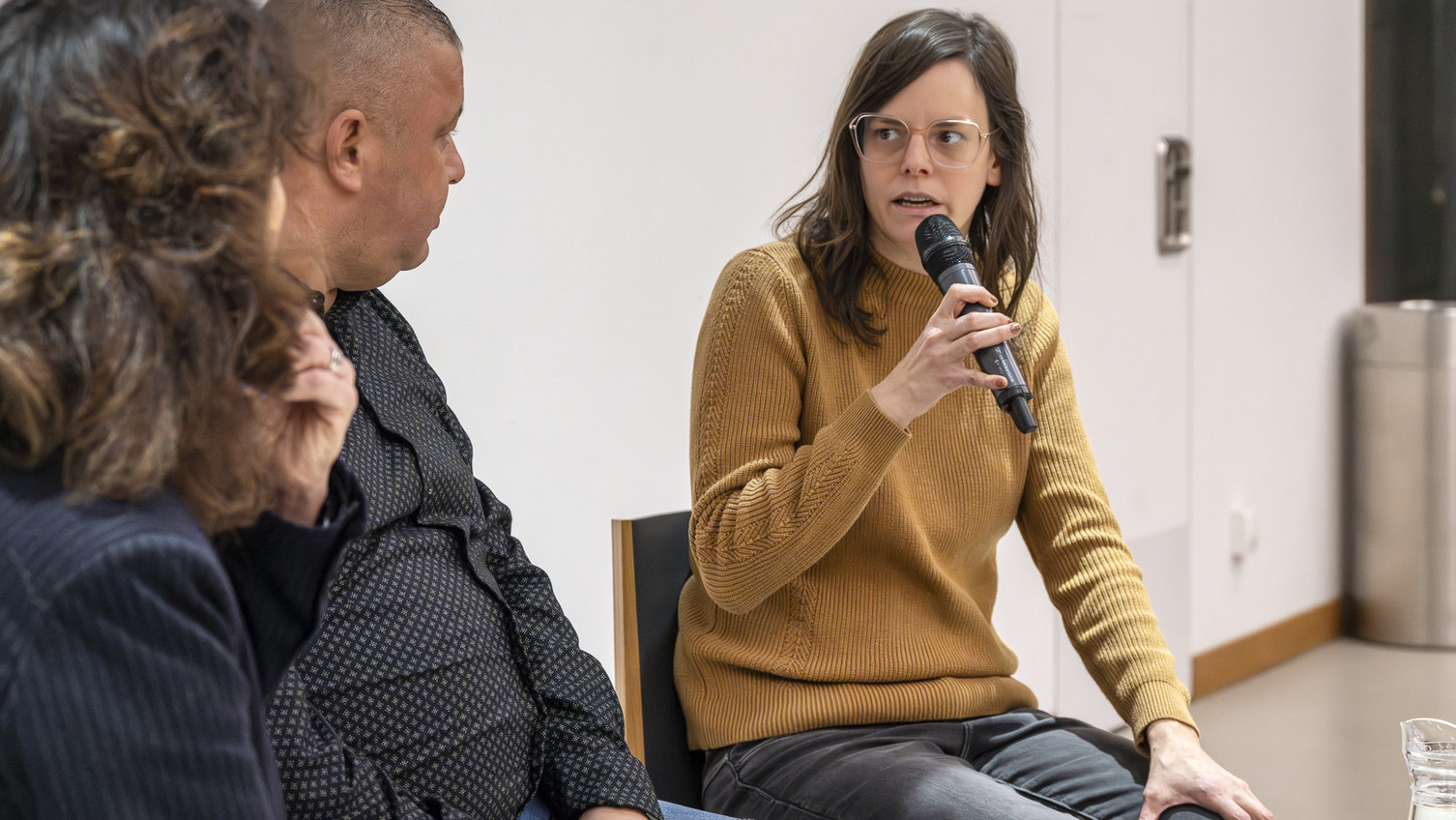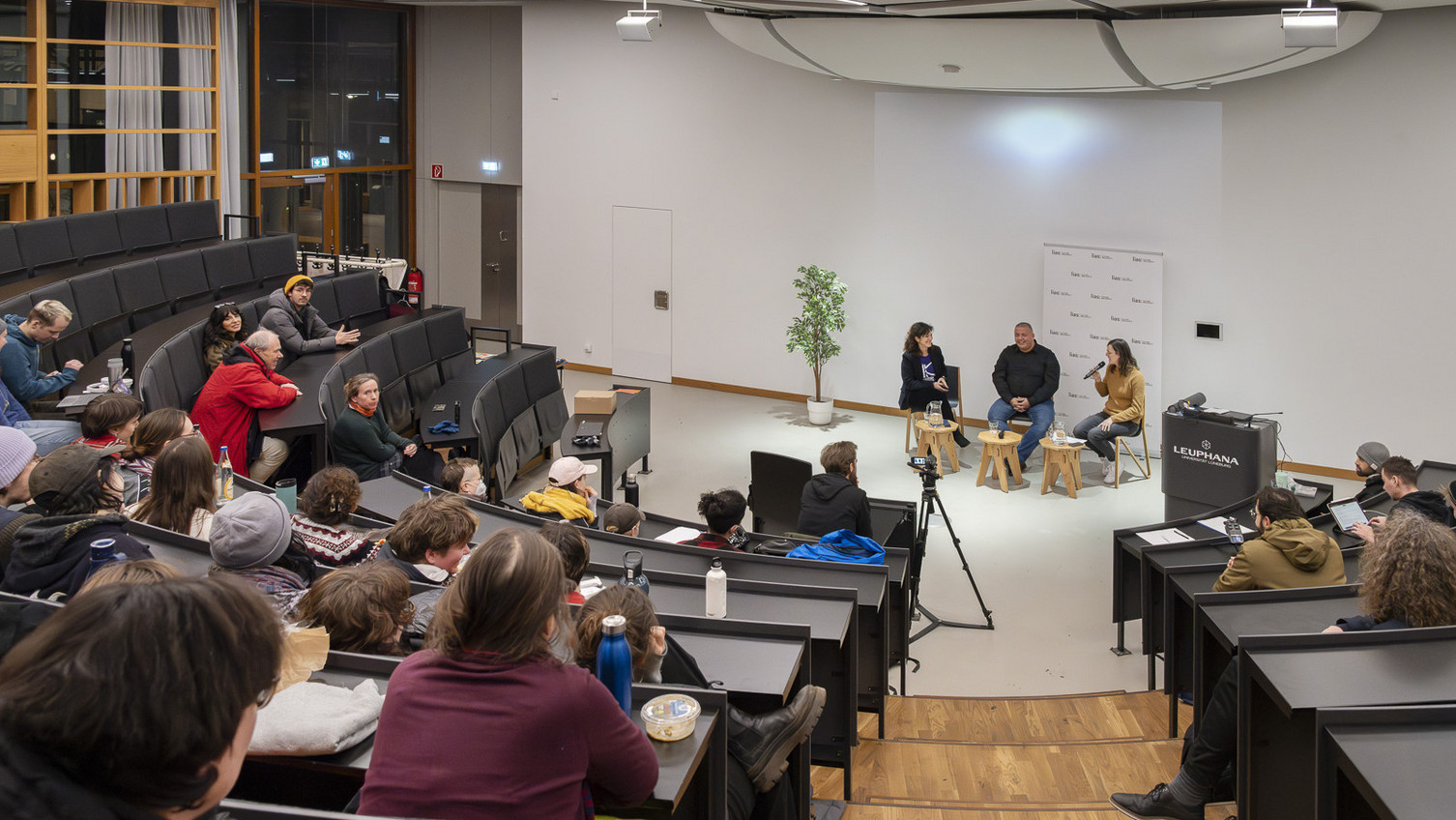LIAS Focus Week: Facing the Far-Right
13-17 January 2025
Leuphana University and the Leuphana Institute for Advanced Studies (LIAS) in Culture and Society jointly organised a focus week entitled ”Facing the Far-Right”. The numerous events were very well attended by students in particular, but also by some guests from the city and the region, and were characterised by lively discussions. There was a palpable sense of concern and a reflected critical examination of the challenges posed by the far right in Germany and Europe. The speakers, many of whom were academics with relevant expertise, placed the threat in historical, theoretical and empirical contexts. They formed the basis for a differentiated view of the current situation and stimulated discussion.
Simon Strick from the Brandenburg Centre for Media Studies has spent ten years investigating the appearance of the far right in the fashosphere and analysing the current dynamics. Strick's conclusion: the existing terms and categories are not sufficient to adequately describe the phenomenon. “I'm not sure whether we can actually talk about a linear rise of the far right or whether this perspective doesn't really do justice to the complex developments.”
A central theme is the influence of right-wing sentiment, which is spread through memes such as “Pepe the Frog” or symbols on platforms such as 4chan. These memes are increasingly crossing the boundary between digital subculture and political reality, as with the memes about Elon Musk and the D.O.G.E. (Department of Government Efficiency).
According to Strick, historicising terms such as “fascism” or warnings based on historical analogies are no longer effective in today's public sphere. The loosely connected world of right-wing affects and actors is better captured by the term fashosphere. This world comprises digital networks, militias and public figures whose actions are increasingly difficult to analyse from the outside as they are dominated by insiders.
Strick sees turning points in the events of Charlottesville 2017, where nerds and armed militias came together with shouts of Deus Vult, and the attack on the Capitol on 6 January 2021. While the linear perspective interprets such events as escalation stages, Strick argues that in their diversity and symbolism they point to a new dynamic. The suicide of a Tesla driver outside a Trump hotel in Las Vegas shows that the iconographic overload of figures such as Musk, Trump or Tesla is playing an increasingly central role.
In terms of cultural studies, Strick sees us in a transition between two eras: the culture war since the 1980s, which was characterised by “metapolitics”, and a new era in which the fashosphere dominates political communication. This expansion of ultra-right discourse into international and cross-class networks is leading to an oversaturation that is transforming the political playing field. “When 62% are extreme,” says Strick, “this is the new normal, demanding new categories. But while Trump pursues racist meta-politics, it remains unclear what the long-term political consequences will be.” The connections within the fashosphere are fragmented - many actors meet symbolically for first dates without clear addressees or common goals. “This lack of direction creates a feeling of uncertainty and fear on the left,” said Simon Strick at the end of his well-attended lecture.
Right-Wing Memes, Right-Wing Affects, Right-Wing Entrepreneurs
Tuesday, 14 January 2025, 6:00–8:00 pm
Laura Hille (Center for Digital Cultures, Leuphana University of Lüneburg), Simon Strick (Brandenburg Centre for Media Studies, ZeM) and Ben Hundertmark (Leuphana University of Lüneburg) took part in the panel discussion, which was moderated by Michael Koß (Leuphana University of Lüneburg). The panel shed light on the dynamics of ultra-right ideologies, their digital manifestations and the links with economic and political power structures.
Ben Hundertmark presented a first empirical study on the digital imagery and legal understanding of the Reichsbürger movement, which he is working on with Andrea Kretschmann (Leuphana University of Lüneburg). The Reich Citizens see themselves in radical opposition to the current German state and its legal structures. Frequent narratives include conspiracy narratives about the Federal Republic as a “German Reich” incapable of acting and the constitution of 1871 as a legitimate point of reference. The memes of the Reichsbürger often convey romanticised visions of a “traditional” Germany and offer supposedly simple answers to complex questions. Thanks to their humorous and affective design, they reach a broad audience and promote a sense of community.
Laura Hille from the Center for Digital Culture analysed the role of entrepreneurs like Peter Thiel and the ideological currents of Silicon Valley in the development of right-wing ideologies. As a prominent member of the “PayPal mafia” and author of the book The Diversity Myth (1995), in which he attacks the political correctness of the time, Thiel has been influencing the narrative and technological landscape for decades, which is not generally known. His companies, such as the software company Palantir, which was banned in Germany in 2023, emphasise the intertwining of big tech with the military and the state. Thiel's example led Hille to the “TESCREAL ideology”, an acronym for Transhumanism, Extropianism, Singularitarianism, (modern) Cosmism, Rationalism, Effective Altruism and Longtermism, a way of thinking that propagates a technocratic world order in which high IQ individuals take power. Laura Hille's thesis is that the narratives of dystopias, coupled with promises of technological utopias, represent a dangerous instrument of power aimed at total control by AGI (Artificial General Intelligence).
Simon Strick presented his thesis on the “memefication” of politics and analysed the mechanisms using the example of a globally known Trump meme from the 2024 US election campaign: “They're eating the dogs, they're eating the cats.” The meme originated from a manipulated Facebook post describing an alleged incident in Springfield, Ohio. This false report was picked up by right-wing influencers and amplified by AI-generated images. Donald Trump and J.D. Vance adopted the meme to fuel racist fears. They deliberately reproduce the aesthetics and language of right-wing internet culture in order to mobilise emotions. The affectivity and emotionality of right-wing memes often give them a special impact, transforming narratives into political realities, while left-wing memes often rely on humorous deconstruction.
In the subsequent discussion with students, it became clear that critical reflection and targeted counter-strategies are required to counter these dynamics, particularly because a sense of enlightenment and community is created within the scene. The consensus was that factual arguments were not enough when it came to the question of what to do about right-wing ideology on the internet. Discussions about feelings and the search for common points of criticism (e.g. inequality) are more likely to offer starting points, as are demonstrations and ideas of expropriating the “tech billionaires”.
In his lecture “The Extreme Right and Present-Day Capitalism: The Examples of Argentina and Spain”, LIAS alumnus Adrià Alcoverro presented his research on the rise of the extreme right in Spain and Argentina. The recent political rise of the extreme right in Argentina under the leadership of Javier Milei marks a turning point in the country's political landscape. Milei's movement (La Libertad Avanza) is characterised by a combination of radical libertarianism and reactionary elements. It relies on populist narratives, polarisation and a targeted mobilisation of right-wing emotions. Milei's movement combines the rhetoric of the anti-establishment with the structures of micro-fascism, as described by Enzo Traverso. Milei's ideology is rooted in the theories of the Austrian and Chicago schools, in particular in the writings of Murray Rothbard (1926-1995), a founder of anarcho-capitalism. Milei's strategy combines this economic radicalism with far-right, populist narratives. He sees the “collectivist left” (zurdos) as the central enemy.
The concept of microfascism offers a key to understanding Milei's politics. This is a form of fascist power that is fuelled by the logic of neoliberal capitalism. Milei's political rhetoric and symbolism draw on three central metaphors: la casta (the caste), la motosierra (the chainsaw) and troll politics.
Milei uses the concept of caste to identify a diffuse elite against which resentment can be mobilised. Anyone and everyone can be declared a “caste”, dissolving social boundaries and creating enemy stereotypes. With a radical policy of cuts - symbolised by the chainsaw - Milei is striving for economic “shock therapy”. Science, education and social programmes were drastically reduced, with poverty rising from 36.5% (2022) to 52.9% (2024). Last but not least, Milei stylises himself as a troll figure who mobilises a male Generation Z through provocation and meme culture. This strategy fuses capitalist dynamics with a political aesthetic of conflict and dehumanisation.
Milei's political order is based on a permanent state of stress and competition. According to Alcoverro, his rhetoric of no hay plata (there is no money) legitimises a neoliberal eschatology that stages the market and God as irrefutable authorities. Milei combines economic extremism with a populist mobilisation that presents Argentina with a historical challenge
One focus of the lecture was the territorial disputes in the region. According to international law, territories such as the Golan Heights and East Jerusalem are not recognised as part of Israel despite their annexation. In particular, the illegal settlement policy and the Nation-State Law of 2018 stand for messianic ideologies that propagate an “all-Israel” between the Mediterranean and the Jordan River and exacerbate conflicts with the Palestinians. Bezalel Smotrich's “determination plan” and the increasing violence of extremist settlers would show how the normalisation of illegal acts creates a culture of impunity. She used the term “impunity” to refer to a study published in May 2024 in the New York Times Magazine by Ronen Bergman and Mark Mazzetti. The authors analyse how the threat to democracy in Israel comes from political actors within Israel. According to Wiedemann, the Israeli government then reacts to national crises with repressive measures, such as the relaxation of gun laws. These developments reinforce the divide within Israeli society and exacerbate the situation of the Palestinians.
Historically, Wiedemann explained the extreme right-wing tendencies using two approaches: Amnon Raz-Krakotzkin sees them as rooted in the Zionist idea since 1948, while Moshe Zimmermann emphasises the break after 1967. Both approaches illustrate how democracy and Zionism have increasingly come into conflict. At the same time, Wiedemann emphasised that there is a lack of differentiated analyses of the political situation in Israel in Germany. And she emphasised the broader context of the rise of the far right in Israel - for example, links to other right-wing movements within Europe, to Orbán, Meloni and LePen. These developments would therefore reflect profound systemic problems rather than isolated phenomena.
In the discussion that followed, students asked about the role of class relations in the emergence of fascism and the role of settler colonialism in the spread of far-right ideologies in Israel. The perceived lack of hope within Israeli civil society for a peaceful solution to the conflict and the desperation of Palestinians were recurring themes that emphasised the complexity of the situation. During the discussion, the audience also referred to various associations, such as Combattants for Peace, the Parents’ Circle Families Forum and Standing Together, which are committed to peaceful coexistence between Jews and Palestinians across all divides.
As part of a critical examination of the “Propaganda strategies of the AfD in Saxony”, Moritz Heinrich and Matthias Sommer (TU Chemnitz) identify central themes and strategies that characterise the party's political communication in the Saxon state parliament. Migration, the environment, and gender are systematically instrumentalised for threat scenarios. In doing so, they construct images of violence, overwork, economic decline and an undesirable social transformation. These topics are generalised and introduced into almost every socio-political debate, even if there is no direct connection.
The AfD's self-portrayal is based on a paradoxical simultaneity of strength and victimhood. On the one hand, it presents itself as the last protective authority of democracy and a direct expression of the will of the people, and on the other hand as the victim of supposed elite conspiracies. Demonstrations against the AfD, for example, are dismissed as staged attacks. The strategy is based on conspiracy theory narratives and deliberately exploits democratic procedures, for example through the mass introduction of motions in parliament.
A central element is the creation of enemies: The Greens are portrayed as a “prohibition party” and as the cause of economic damage, while the CDU is accused of betraying Saxon citizens and its values. The AfD uses this polarisation to stylise itself as the only legitimate antithesis and representative of a supposedly homogeneous will of the people. Heinrich and Sommer recognise clear parallels in the AfD's agitation to fascist propaganda methods of the 1930s, particularly in the construction of diffuse enemy images and ideological flexibility. According to their diagnosis, this diffuseness enables the AfD to link different threat scenarios and position itself as a universal problem solver while at the same time obscuring how its demands are compatible with democratic principles or applicable law. Instead, the party emphasises specific grievances without offering substantial solutions. The discussion emphasised the importance of diffuseness, which allows the AfD to respond flexibly to various social fears. The role of the Greens as an enemy was also scrutinised. They symbolise a grassroots democratic past, which is contrasted with the current crisis of representation. The question of how the AfD gains its support in minority groups was also addressed, as its propaganda also appeals to specific groups such as voters of Turkish origin.
As part of his discussion of Michel Pêcheux (1938-1983), Ivo Eichhorn (Goethe University Frankfurt a.M.) addresses the role of the masses in an ideological and political context. Pêcheux put forward the thesis that the masses are neither subject nor object, thus setting himself apart from traditional Marxist and legal perspectives that treat the masses either as a unified subject or as a passive object. Pêcheux, on the other hand, argued that although masses represent forces of action, they lack the unity that would be necessary for subjectivisation. At the same time, their active role deprives them of the statuslessness of a pure object.
A central concept for Pêcheux is de-identification. Masses can neither be completely represented nor homogenised. According to Eichhorn, the decoupling of identity and representation opens up a space in which ideology can be understood not as a fixed structure, but as a dynamic arena of class struggle.
In Ivo Eichhorn’s analysis, it became clear that this theory can be applied to the emergence of fascist structures. Eichhorn referred to the mechanisms of delegitimisation of democratic systems, especially in parliamentary democracies of the 1920s. He highlighted two central aspects: abstract equality before the law despite actual social inequalities and the representation of a national, homogenised mass. In times of crisis, fascisation leads to a reinterpretation of democratic relations by contrasting the people and the leadership. The masses are declared to be the subject, enemies of the people are discredited, disenfranchised and marginalised.
What is particularly perfidious about this process is that people actively participate in their own oppression, for example through the appeal of simple explanations and emotional narratives, as can also be seen in AfD propaganda. Eichhorn concludes that the ideological construction of the masses as subject and object forms the basis of fascist agitation. As such, the dynamics that are evident in the delegitimisation of democratic representation and the reinforcement of homogeneous enemy images can be considered as an important aspect for the investigation of current authoritarian tendencies.
LIAS Fellows Kerstin Stakemeier and Danny Hayward discussed Alberto Toscano's book Late Fascism. Hayward emphasised the adaptable nature of fascism, which cannot be captured by rigid definitions. Toscano describes it as a “counter-revolution without revolution”, which is characterised by the appropriation of left-wing concepts, for example. This creates confusion and undermines progressive movements. Toscano's focus on the temporality of fascism shows how it unfolds in late capitalism and utilises historical continuities. Kerstin Stakemeier analysed the “Alt-Right” (“alternative right”) and its infiltration of art spaces. As an example, she cited the controversy surrounding the LD50 Gallery in London in 2017, which became a centre of alt-right discourse, but also addressed the current activities of the New York gallery Reena Spaulings. Both LIAS Fellows emphasised how important it is to reclaim left-wing ideas and their anchoring in the original context of struggle and liberation, and to strategically counter the destructive appropriation of progressive resources by fascism.
The evening began with a screening of the film “The Barber and the Bomb” (2016, directed by Andreas Maus), which addresses the consequences of the racially motivated violence of the National Socialist Underground (NSU) and the inadequate social and political debate surrounding the nail bomb attack. Afterwards, the work of the “Keupstraße erinnern” initiative and the treatment of those affected by the NSU nail bomb attack were presented and discussed.
Abdulla Özkan, one of the victims of the attack and a participant in the film, described how he was sceptical at first, but decided to support the project after talking to the filmmakers. Despite the high quality of the film and its unique perspective on the danger of the NSU, the public response remained low. Özkan emphasised the importance of the film, in which many of the participants overcame their fears and spoke publicly for the first time. As a result, new insights about the incidents in the Keupstraße came to light.
Karmen Frankl from the “Keupstraße is everywhere” initiative reported that she came to Keupstraße with director Andreas Maus in 2013 to do research for the film. Maus, an investigative journalist, had previously studied thousands of files on the case. The initiative was founded to support those affected, to help them through their pain and to bring them out of their isolation. Since then, the initiative has organised events, exhibitions, and talks throughout Germany to raise awareness of the consequences of the attack and structural racism.
When asked about the impact of the reporting - often defamatory referred to as the “kebab murders” - Özkan explained that they had to suffer from generalised prejudices for seven years. Only the NSU's self-exposure brought a certain redemption, although many prejudices remain. Özkan criticised leading politicians in particular. For example, he deliberately refused to shake hands with Joachim Gauck, who had announced an apology for omissions during an earlier visit, but failed to do so. The 20th anniversary commemoration of the attack last year also revealed a lack of understanding in Özkan's eyes: those affected were ignored, the organisation was neglected, and the commemorative event seemed superficial.
The students were moved by Özkan's report on the lack of support from official bodies. Although the psychological strain was enormous, those affected had to organise therapy and medical support themselves. While large sums of money were spent on press-worthy visits, there was a lack of systematic victim assistance and support services. The “Keupstraße is everywhere” initiative is trying to set up a counselling centre for victims of violence with trained therapists, but the process is lengthy and there is a lack of financial support.
The initiative works closely with other organisations to improve the structures for supporting victims and to raise awareness of racist violence in the long term. The guests of this evening at Leuphana University Lüneburg, Abdulla Özkan and Karmen Frankl, invited students to spread the stories of those affected, educate the public and build long-term structures for support. Dealing with racist violence affects everyone and requires a collective commitment that goes beyond nationality and individual victimisation.

